Of occult, entangling alliances…
“So gorgeous was the spectacle on the May morning of 1910 when nine kings rode in the funeral of Edward VII of England that the crowd, waiting in hushed and black-clad awe, could not keep back gasps of admiration. In scarlet and blue and green and purple, three by three the sovereigns rode through the palace gates, with plumed helmets, gold braid, crimson sashes, and jeweled orders flashing in the sun. After them came five heirs apparent, forty more imperial or royal highnesses, seven queens – four dowager and three regnant – and a scattering of special ambassadors from uncrowned countries. Together they represented seventy nations in the greatest assemblage of royalty and rank ever gathered in one place and, of its kind, the last. The muffled tongue of Big Ben tolled nine by the clock as the cortege left the palace, but on history’s clock it was sunset, and the sun of the old world was setting in a dying blaze of splendor never to be seen again.”
“Thereafter the red edges of war spread over another half of the world. Turkey’s neighbors, Bulgaria, Rumania, Italy, and Greece, were eventually drawn in. Thereafter, with her exit to the Mediterranean closed, Russia was left dependent on Archangel, icebound half the year, and on Vladivostok, 8,000 miles from the battlefront. With the Black Sea closed, her exports dropped by 98 per cent and her imports by 95 per cent. The cutting off of Russia with all its consequences, the vain and sanguinary tragedy of Gallipoli, the diversion of Allied strength in the campaigns of Mesopotamia, Suez, and Palestine, the ultimate breakup of the Ottoman Empire, the subsequent history of the Middle East, followed from the voyage of the Goeben.”
“SOME DAMNED FOOLISH THING in the Balkans,” Bismarck had predicted, would ignite the next war. The assassination of the Austrian heir apparent, Archduke Franz Ferdinand, by Serbian nationalists on June 28, 1914, satisfied his condition.”
“in the midst of war and crisis nothing is as clear or as certain as it appears in hindsight”
― Barbara W. Tuchman, The Guns of August
By Yang Sheng at Global Times.
Xi meets Lavrov, reaffirms China’s emphasis on partnership with Russia
Chinese President Xi Jinping met with Russian Foreign Minister Sergey Lavrov on Tuesday in Beijing. Chinese analysts said the meeting sends a strong signal that China will firmly develop its strategic partnership with Russia, despite pressure from the West. The China-Russia partnership continues to be key for the global strategic balance and the hope for promoting a multipolar world in which countries of the Global South will have greater roles to play.
Xi asked Lavrov to convey his sincere greetings to Russian President Vladimir Putin. Noting that this year marks the 75th anniversary of the establishment of diplomatic ties between the two countries, Xi said China and Russia have embarked on a new path of harmonious coexistence and win-win cooperation between major countries and neighbors, which has benefited the two countries and their peoples and contributed wisdom and strength to international fairness and justice, the Xinhua News Agency reported on Tuesday.
Earlier in the day, Chinese Foreign Minister Wang Yi held talks with Lavrov in Beijing, and both sides expressed hope for strengthening practical cooperation in various fields, Xinhua reported.
Wang, also a member of the Political Bureau of the Communist Party of China Central Committee, said that China is willing to work with Russia, in accordance with the consensus reached by the two heads of state, to strengthen the synergy of the two countries’ development plans and promote practical cooperation in various fields.
The top diplomats of the two countries held a joint press conference after their meeting. Wang mentioned “five always” at the press conference. For example, he said that the two countries should always follow the strategic guidance of head-of-state diplomacy, and should always adhere to the principle of no-alliance, no-confrontation and no-targeting at any third party.
China and Russia should always stay on the right course on major matters of principle. As permanent members of the UN Security Council and major emerging countries, China and Russia actively respond to the common aspirations and legitimate concerns of the people of all countries, advocate a new path of state-to-state relations featuring dialogue and partnership rather than confrontation and alliance, and actively promote the building of a community with a shared future for humanity, said Wang.
Yang Jin, an associate research fellow at the Institute of Russian, Eastern European and Central Asian Studies at the Chinese Academy of Social Sciences, told the Global Times on Tuesday that the remarks made by Xi and the “five always” raised by Wang provide a “framework and outline” for the future development of the China-Russia comprehensive strategic partnership of coordination.
Yet many voices from the West, mainly from the US as well as some senior NATO officials, insist on depicting the China-Russia relationship as akin to an “anti-West alliance,” which is completely wrong. By reaffirming the principles of “non-alignment, non-confrontation, and not targeting any third party,” China and Russia are refuting those voices with a clear stance, experts said.

Dress down at the dilapidated Captain Cook Hotel in Anchorage, Alaska, March 18, 2021.
Multipolar world
China always attaches great importance to the development of China-Russia relations, and stands ready to strengthen bilateral communication with Russia and enhance multilateral strategic coordination in BRICS and the Shanghai Cooperation Organisation (SCO), Xi said when meeting with the visiting Russian top diplomat.
Xi said that the two countries will show more responsibility, unite countries in the Global South in the spirit of equality, openness, transparency and inclusiveness, promote the reform of the global governance system, and vigorously lead the building of a community with a shared future for humanity.
China and Russia are trying to promote a multipolar world where developing countries and emerging economies of the Global South will play a greater role, which is the antithesis of the unipolar world dominated by the US, analysts said.
“China and Russia will not target any third party, but if hegemonic forces threaten China and Russia, or threaten world peace, China and Russia will stand together and fight to protect their own interests and safeguard world peace together,” said Li Haidong, a professor at the China Foreign Affairs University.
This is why China and Russia, as well as other members in the UN Security Council, are pushing an immediate cease-fire and the resumption of humanitarian aid to Gaza, even as the US vetoed these attempts time and again, before the Ramadan cease-fire resolution eventually passed on March 25, experts said.
Wang said at the joint press conference that Russia will hold the BRICS presidency this year, and China will take over the rotating presidency of SCO this year. The two sides will support each other’s chairmanship and light up the “moment of South” global governance.
Richard Sakwa, professor of Russian and European politics at the School of Politics and International Relations of the UK’s University of Kent, told the Global Times at a forum in Beijing on March 28 that China-Russia relations are “one of the key axes for international politics, and it’s not only very important but also necessary” to maintain the global strategic balance.
Lavrov said at the meeting with Wang that Russia supports the China-initiated Global Security Initiative, and is willing to deepen cooperation with China on multilateral platforms to promote the establishment of a more just and democratic international order.
The two sides also had in-depth exchanges on the Ukraine issue, the Palestinian-Israeli conflict, the situation in the Asia-Pacific region and other international and regional issues of common concern.
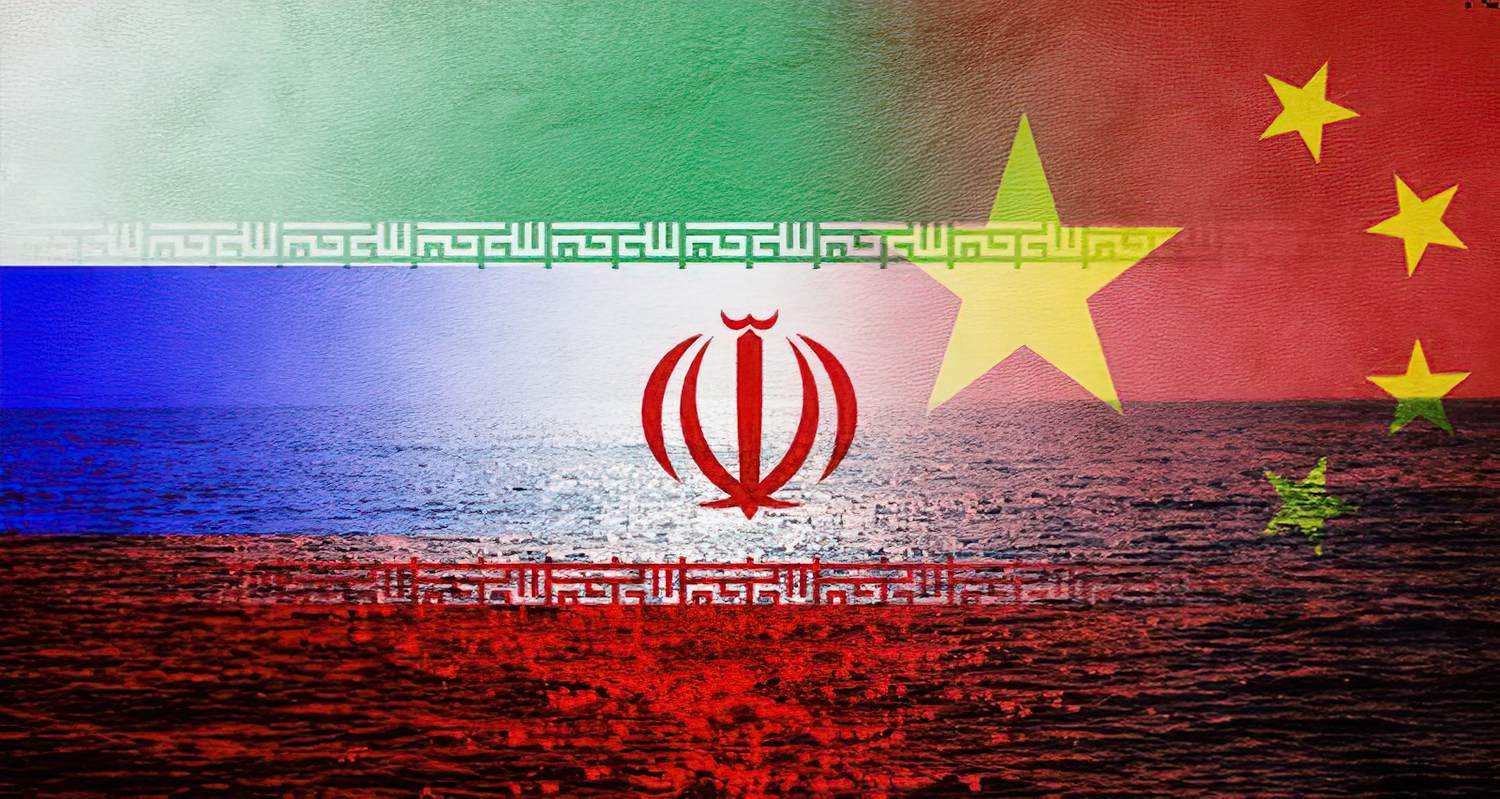
Ukraine crisis and counterterrorism
Wang said at the joint press conference with Lavrov that on the Ukraine issue, China hopes to see a “cease-fire and an end to the war as soon as possible.” China supports the timely convening of an international conference recognized by both Russia and Ukraine, with equal participation by all parties, and a fair discussion of all peace options, whether it is track one or track two, Wang noted.
Cui Heng, a scholar from the Shanghai-based China National Institute for SCO International Exchange and Judicial Cooperation, told the Global Times on Tuesday that “some Western countries have always blamed China for its ‘pro-Russia’ stance, but actually we are just asking for a mechanism that can be accepted by all parties and can treat everyone equally.”
“China’s stance is based on the desire to stop the bloodshed, but the US’ stance is to use the [Russia-Ukraine] conflict to weaken Russia as much as possible. The development of the crisis to some extent depends on the US presidential election later this year,” Cui noted “If Donald Trump is elected, there will be a chance to break the deadlock, but if Joe Biden gets reelected, we might also see some changes, as Washington and its allies might not be able to afford the war anymore.”
Xi stressed at the meeting with Lavrov that China supports the Russian people in following a development path that suits their national conditions, and supports Russia in combating terrorism and maintaining social security and stability.
At the joint press conference with Lavrov on Tuesday, Wang stressed that China must also pay attention to the resolution of other global and regional hot spot issues, including continuing to counter terrorism. “China once again reiterated its condemnation of the terrorist attack in Moscow and its condolences and support for Russia,” said Wang.
“The Chinese people are also victims of terrorism, and terrorism has always been a common threat facing mankind. The international community should resolutely combat all forms of terrorism with a ‘zero tolerance’ attitude, firmly support the efforts of all parties to maintain national security and stability, strengthen international anti-terrorism cooperation, coordinate development and security, and eliminate the breeding grounds for terrorism,” Wang remarked.
“I want to thank China for their condolences in connection with the terrorist attack in the Moscow Region on March 22, and for their support of Russia’s fight against terrorism,” Lavrov said during the meeting with Wang.
All those involved [in the terrorist attack] will be certainly punished, Russia’s top diplomat stated. “Our [Russia-China] cooperation on counter-terrorism will continue, including within the framework of multilateral institutions.”
China and Russia are two major powers in the SCO, and counter-terrorism cooperation between them and other SCO members is significant for regional peace and stability, especially when the threat of terrorism has reemerged in relevant regions, experts said. Apart from the discussion on the diplomatic level, the militaries, law-enforcement and intelligence agencies of the two countries will promote cooperation on combating terrorism, experts said.
… as the whole planet awaits with bated breath the avowedly inevitable Iranian response to the attack against its consulate/ambassador residence in Damascus by the biblical psychopaths responsible for the Gaza genocide.
By Pepe Escobar at Sputnik International.
Enveloped in an aura of secrecy, each passing day betrays the immensity of the challenge: the possibly asymmetrical response must be, simultaneously, symbolic, substantive, cogent, convincing, reasonable and rational. That is driving Tel Aviv totally hysterical and the deciding instances of the Hegemon extremely itchy.
Everyone with a functioning brain knows this wet dream of a stunt from the point of view of hardcore Zionists and US Christian zio-cons was a serious provocation, designed to draw the US to the long-cherished Israeli plan of striking a decisive blow against both Hezbollah and Tehran.
The IDF’s Chief of Staff Herzi Halevi all but gave away the game, when he said this past Sunday that “we are operating in cooperation with the USA and strategic partners in the region.”
Translation: never trust the Hegemon even as the notion is floated – via Swiss mediators – that Washington won’t interfere with Tehran’s response to Tel Aviv. One just needs to remember Washington’s “assurances” to Saddam Hussein before the first Gulf War.
It’s impossible to take Hegemon back-channel assurances at face value. The White House and the Pentagon occasionally dispense these “assurances” to Moscow every time Kiev strikes deep inside the Russian Federation using US-UK satellite intel, logistics, weaponry and with NATO in de-facto operational control.
The state terror attack on Damascus, which shredded the Vienna convention on diplomatic immunity, crucially was also an attack on both the expanded BRICS and the Shanghai Cooperation Organization (SCO). Iran is a member of both multilateral bodies, and on top of it is engaged in strategic partnerships with both Russia and China.
"If Iran attacks from its territory – Israel will respond and attack in Iran," Israel's foreign minister threatened Iran with strikes, tweeting in Hebrew and Persian and tagging Iranian Supreme Leader Ali Khamenei.
Iran's supreme leader, for his part, later said that the Israeli… pic.twitter.com/eWq4XDmu3Y
— Sputnik (@SputnikInt) April 10, 2024
So it’s no wonder the leadership in both Beijing and Moscow carefully consider all possible repercussions of the next Iranian move.
Tel Aviv’s purposeful escalation – when it comes to expanding war in West Asia – happens to mirror another escalation: NATO’s no way out in Ukraine except by doubling down, with no end in sight.
That started with the invariably out of his depth Secretary of State Little Tony Blinken affirming, on the record, that Ukraine will (italics mine) join NATO. Which any functioning brain knows is translatable as the road map towards a Russia-NATO hot war with unbelievably dire consequences.
Little Blinkie’s criminal irresponsibility was duly picked up and reverberated by the Franco-British duo, as expressed by British FM David “of Arabia” Cameron and French FM Stephane Sejourne: “If Ukraine loses, we all lose”.
At least they got that (italics mine) right – although that took ages, when it comes to framing NATO’s approaching cosmic humiliation.
“Dual Opposition” to “Dual Deterrence”
Now let’s switch from clownish bit players to the adults in the room. As in Russian FM Sergei Lavrov and Chinese FM Wang Yi discussing literally every incandescent dossier together earlier this week in Beijing.
Lavrov and Wang could not be clearer on what’s ahead for the Russia-China strategic partnership.
They will engage together on all matters regarding Eurasian security.
They will go, in Lavrov’s words, for “dual opposition” to counterpunch the West’s “dual deterrence”.
They will be countering every attempt by the usual suspects to “slow down the natural course of history”.
Add to it the confirmation that President Putin and President Xi will hold at least two bilaterals in 2024: at the SCO summit in June and at the BRICS summit in October.
In a nutshell: the dogs of Forever Wars bark while the Eurasian integration caravan marches on.

Both Lavrov and Wang made it very clear that while steering through “the natural course of history”, the Russia-China strategic partnership will keep seeking a way to resolve the Ukraine tragedy, taking into account Russia’s interests.
Translation: NATO better wake up and smell the coffee.
This bilateral at the FM level in Beijing is yet another graphic proof of the current tectonic shift in what the Chinese usually describe as the “world correlation of forces”. Next month – already confirmed – it will be Putin’s turn to visit Beijing.
It’s never enough to remember that on February 4, 2022, also in Beijing, Putin personally explained to Xi why NATO/Hegemon expansion into Ukraine was totally unacceptable for Russia. Xi, for all practical purposes, understood the stakes and did not subsequently oppose the SMO.
This time, Lavrov could not but refer to the 12-point peace plan on Ukraine proposed by Beijing last year, which addresses the root causes “primarily in the context of ensuring indivisible security, including in Europe and the world over.”
Your “Overcapacity” is Driving Me Nuts
Both Tehran and Moscow face a serious challenge when it comes to the Hegemon’s intentions. It’s impossible to definitely conclude that Washington was not in the loop on Tel Aviv’s attack on Iran in Damascus – even though it’s counter-intuitive to believe that the Democrats in an election year would willingly fuel a nasty hot war in West Asia provoked by Israel.
Yet there’s always the possibility that the White House-endorsed genocide in Gaza is about to extrapolate the framework of a confrontation between Israel and Iran/Axis of Resistance – as the Hegemon is de facto implicated in myriad levels.
To alleviate such tension, let’s introduce what under the circumstances can be understood as comic relief: the “Yellin’ Yellen goes to China” adventure.
US Secretary of Treasury Janet Yellen went to Beijing to essentially deliver two threats (this is the Hegemon, after all).
1. Yellen said that Chinese companies could face “significant consequences” if they provided “material support for Russia’s war on Ukraine.”
2. Yellen accused Chinese companies of “overcapacity” – especially when it comes to the electric-vehicle (EV) industry (incidentally, 18 of the top 20 EV companies around the world are Chinese).
The Chinese, predictably, dismissed the whole show with barely a yawn, pointing out that the Hegemon simply cannot deal with China’s competitive advantage, so they resort to yet another instance of “de-risking” hype.
In sum: it’s all about barely disguised protectionism. Chinese Commerce Minister Wang Wentao went straight to the point: China’s advantage is built on innovation, not subsidies. Others added two extra key factors: the efficiency of supply chains and ultra-dynamic market competition. EVs, in China, along with lithium batteries and solar cells, are known as the new “three major items.”
Yellin’ Yellen’s theatrics in Beijing should be easily identified as yet another desperate gambit by a former hyperpower which no longer enjoys military supremacy; no dominant MICIMATT (the military-industrial-congressional-intelligence-media-academia-think tank complex, in the brilliant formulation by Ray McGovern); no fully controlled logistics and sea lanes; no invulnerable petrodollar; no enforced, indiscriminate fear of sanctions; and most of all, not even the fear of fear itself, replaced across the Global South by rage and utter contempt for the imperial support for the genocide in Gaza.

Just a Tawdry Greek Tragedy Remix
Once again it’s up to the inestimable Michael Hudson to succintly nail it all down:
“The official US position recognizes that it can’t be an industrial exporter anymore, though how is it going to balance the international payments to support the dollar’s exchange rate? The solution is rent-seeking. That’s why the United States says, well, what’s the main new rent-seeking opportunity in world trade? Well, it’s information technology and computer technology.
That’s why the United States is fighting China so much, and why President Biden has said again and again that China is the number one enemy. It moved first against Huawei for the 5G communications, and now it’s trying to get Europe and American and Taiwanese exporters not to export a computer chip to China, not for the Dutch to export chip-engraving machinery to China. There’s a belief that somehow the United States, if it can prevent other countries from producing high-technology intellectual property rents, then other countries will be dependent.
Rent-seeking really means dependency of other countries if they don’t have a choice to pay you much more money than the actual cost of production. That’s rent, the price over value. Well, the United States, since it can’t compete on value because of the high cost of living and labor here, it can only monopolize rent.
Well, China has not been deterred. China has leapfrogged over the United States and is producing its own etching machinery, its own computer chips. The question is, what is the rest of the world going to do? Well, the rest of the world means, on the one hand, the global majority, Eurasia, the BRICS+, and on the other hand, Western Europe. Western Europe is right in the middle of all this. Is it really going to forego the much less expensive Chinese exports at cost, including normal profit, or is it going to let itself be locked into American rent-extraction technology, not only for computer chips but for military arms?”

Graphically, this eventful week provided yet another howler: Xi officially received Lavrov when Yellin’ Yellen was still in Beijing. Chinese scholars note how Beijing’s position in a convoluted triad is admirably flexible, compared to the vicious deadlock of US-Russia relations.
No one knows how the deadlock may be broken. What is clear is that the Russia-China leadership, as well as Iran’s, know full well the dangers roaming the chessboard when the usual suspects seem to go all out gambling everything, even knowing that they are outgunned; outproduced; outnumbered; and outwitted.
It’s a tawdry Greek tragedy remix, alright, yet without the pathos and grandeur of Sophocles, featuring just a bunch of nasty, brutish specimens plunging into their unblinking, self-inflicted doom.
Just a couple of adults in a room in Beijing..
with appreciation to Dr. Karl at karlof1’s Geopolitical Gymnasium.
Today Lavrov finished two days of intensive talks with the Russian delegation’s counterparts in Beijing, intensive because there’s so much to cover in such a short time. Further work will be done by Deputy Ministers between now and the next major meeting that will likely be a Putin/Xi Summit. What follows are two documents, a statement by Wang Yi, “the ‘Five Always’ of China-Russia Relations,” followed by Lavrov’s remarks to the press and short Q&A session:
On April 9, 2024, Wang Yi, member of the Political Bureau of the CPC Central Committee and Foreign Minister of the Communist Party of China, jointly met with reporters after holding talks with Russian Foreign Minister Sergei Lavrov in Beijing.
Wang Yi said that this year marks the 75th anniversary of the establishment of diplomatic relations between China and Russia. Over the past three-quarters of a century, China-Russia relations have gone through ups and downs, endured strength, and become increasingly mature, tenacious and deep. The two sides regard each other as priority cooperative partners, uphold the spirit of permanent good-neighborliness, friendship and comprehensive strategic coordination, elevate bilateral relations to the highest level in the history of the comprehensive strategic partnership of coordination in the new era, and set an example of friendly exchanges and win-win cooperation between major countries and neighboring countries. Looking back on the past and looking forward to the future, in order to further consolidate and develop Sino-Russian relations, we must achieve “five always”:
The two sides should always follow the strategic guidance of the diplomacy of the heads of state. President Xi Jinping and President Putin have grasped and mapped China-Russia relations from the depth of history and the height of the times, and have continuously injected new impetus into the comprehensive strategic partnership of coordination in the new era. This year, the two heads of state will continue to maintain close exchanges through various means, and the two sides will follow the consensus reached by the two heads of state as the fundamental principle to promote the steady and long-term development of bilateral relations.
The two sides should always adhere to the principle of “non-alignment, non-confrontation and non-targeting of any third party”. China and Russia have gone through ups and downs, and the two sides have summed up historical lessons and found a correct path to promote the healthy and stable development of bilateral relations. Today’s good relations between China and Russia are not easy to come by, and they deserve to be cherished and meticulously safeguarded by both sides.
The two sides must always stick to the right path in the face of major issues of right and wrong. As permanent members of the UN Security Council and major emerging powers, China and Russia should take a clear-cut stand on the side of historical progress and fairness and justice, actively respond to the universal aspirations and legitimate concerns of the people of all countries, advocate that all countries follow a new path of state-to-state exchanges based on dialogue, non-confrontation and partnership, oppose all acts of hegemony and bullying, oppose the Cold War mentality and inciting division and confrontation, and actively promote the building of a community with a shared future for mankind.
The two sides should always pursue win-win results in cooperation. China and Russia will more actively seek the convergence of the interests of the two countries, give full play to their respective advantages, carry out mutually beneficial cooperation, and achieve mutual achievements. China and Russia will continue to focus on the well-being of the two peoples, advocate inclusive economic globalization, jointly oppose unilateralism and protectionism, oppose “building walls and barriers” and “decoupling and breaking chains”, work together to maintain the stability of international industrial and supply chains, and cultivate new drivers for global development and progress.
The two sides should always promote a multipolar world in an equal and orderly manner. Both China and Russia believe that the current world is undergoing great changes and the “Global South” is gaining momentum, and that it is necessary to uphold the equality of all countries, big or small, oppose hegemonism and power politics, oppose the monopoly of international affairs by a few countries, and earnestly promote the democratization of international relations. Both China and Russia support the central position of the United Nations in the global governance system, and the two sides will further strengthen international cooperation. Russia will assume the chairmanship of the BRICS this year, and China will take over the rotating chairmanship of the Shanghai Cooperation Organization (SCO) this year. The two sides will support each other’s presidency and light up the “South moment” of global governance.

We should all hope that the progress to the “South moment of global governance” isn’t derailed by the Zionist megalomaniacs and their sponsors who through their sponsorship have revealed what they really are and their true values. Now for Lavrov’s statement:
Ladies and gentlemen,
First of all, I would like to once again express my gratitude to my colleague and friend, Foreign Minister Wang Yi of the People’s Republic of China, for the invitation and warm welcome to our delegation.
Yesterday and today, we held detailed and specific talks on a wide range of issues of mutual interest. As Minister Wang Yi has just noted, we paid special attention to the schedule of contacts at the highest level, since the diplomacy of the leaders, without exaggeration, is the central element of the Russian-Chinese comprehensive partnership and strategic cooperation. It is thanks to the diplomacy of the leaders (first of all) that bilateral relations have reached an unprecedentedly high level and continue to develop dynamically in a very difficult situation in the world.
As I have already said, the focus was on the schedule of contacts at the highest level, the upcoming meetings of our leaders on the sidelines of various international events, including the BRICS summit in Kazan in October of this year and the SCO summit in Astana in June of this year.
We talked about contacts between the Foreign Ministry. In your presence, we have just signed another plan for inter-ministerial consultations for 2024 and briefly touched upon certain issues of intergovernmental cooperation in practical areas. This set of tasks will be considered in more detail during the upcoming five intergovernmental commissions headed by deputy prime ministers this year in preparation for the next regular meeting of the heads of government.
The issues that we are addressing in the economy, trade, investment, and the introduction of new technologies are directly related to the struggle to establish a just multipolar world order, where there is no place for dictates, hegemony, neocolonial and colonial practices, which are now being used with might and main, by the United States and the rest of the “collective West,” which has unquestioningly submitted to the will of Washington.
China and Russia will continue to advocate the need to rectify this situation in international economic relations, advocate the democratization of these relations and a return to the principles that were once proclaimed and consist in the need to respect market processes, fair competition, the inviolability of property, the presumption of innocence and many other things, which the West is now grossly undermining with its practical steps in imposing illegal sanctions against a number of countries, including Russia. But the same policy is beginning to be actively applied to the People’s Republic of China. In particular, in the desire to limit its opportunities for economic and technological development, or, to put it simply, for the sake of eliminating competitors.
We reviewed the upcoming Russia-China Cross Years of Culture. Their opening is expected in the very near future. We also talked about other areas of humanitarian cooperation, including the preparation of new events, such as the Intervision International Song Contest, the Open Eurasian Film Award and a number of sporting events. Following the Games of the Future held in Kazan in February-March of this year, where Chinese athletes took an active part (a Chinese delegation was sent), the BRICS Sports Games, the Children of Asia Games, and the World Friendship Games will be held. There are many sporting events that, unlike some others, will be based on the very ideals of Olympism that are enshrined in the Olympic Charter and which the current leadership of the International Olympic Committee, to its shame (I hope), despises and tramples on in favor of the same hegemons who are trying to preserve this role of hegemons by hook or by crook.
As dear Minister Wang Yi mentioned, we talked about the upcoming 75th anniversary of the establishment of diplomatic relations between our countries. Let me remind you that the Soviet Union was the first to recognise the People’s Republic of China literally the day after its formation and actively cooperated in resolving the issue of restoring the Chinese state. We have agreed to prepare a series of events for this anniversary. We also discussed possible events for the upcoming 80th anniversary of Victory over German Nazism and Japanese militarism next year. The peoples of the Soviet Union and the People’s Republic of China made a decisive contribution to the defeat of Germany and militarist Japan.
For obvious reasons, we devoted a lot of time to coordinating our actions in the international arena. This coordination is based on a broad convergence of interests and approaches to key international issues. In the light of Russia’s BRICS chairmanship, we focused on the prospects for the further development of this association, taking into account the inclusion of new members, the formation of a new category of partner countries and, in general, the prospects for the summit in Kazan, which will be held in October this year. We will consider the key issues that are being submitted for consideration by our leaders.
We talked about cooperation within the framework of the Shanghai Cooperation Organisation, where, following Kazakhstan, the People’s Republic of China will assume the chairmanship in June of this year. There are good prospects for harmonizing the agendas of the Shanghai Cooperation Organisation on the development of this vast Eurasian region, on the one hand, and the BRICS programmes, which promote the same ideals and principles at the global level. In fact, it is promoting the interests of the countries of Asia, Africa and Latin America at a time when globalization, created according to the model of the West, is degrading and completely discrediting itself.
Of course, we discussed our cooperation at other venues, including the UN, the G20 and the Asia-Pacific Economic Cooperation. Everywhere we have established close, useful and productive ties.
We talked about the current state of affairs around the Ukrainian crisis. We are grateful to our Chinese friends for their objective and balanced position and for their readiness to play a positive role in the political and diplomatic settlement. The well-known “12 points” that China singled out in 2023 clearly formulate the need, firstly, to take into account the root causes of this conflict, and secondly, to seek to eliminate these causes in the efforts to resolve them, primarily in the context of ensuring equal and indivisible security, including in Europe and in the world as a whole.Our Chinese friends clearly state the need to take into account the legitimate concerns of all parties involved, primarily in the field of security. In this context, together with our Chinese colleagues, we confirmed the conclusion that any international events that not only do not take into account Russia’s position, but completely ignore it and promote the absolutely empty, ultimatum “Vladimir Zelensky’s peace formula” and thus are completely detached from any realities.
We talked a lot about the tasks of ensuring security and stability in the Asia-Pacific region against the backdrop of the US policy of creating closed military-political alliances of a narrow size there. They have an openly anti-Chinese and anti-Russian orientation and, among other things, are aimed at breaking the security architecture that has been developing around ASEAN for many decades within the framework of the very formats that this association has proposed to its partners, and which are based on inclusiveness, consensus, mutual respect and the rejection of unilateral actions. All this does not suit the United States and its allies. As I have already said, they are promoting bloc approaches here and declaring the need to introduce the North Atlantic Alliance into this region.
With regard to the situation around Taiwan, which is an inalienable part of China, we are united with Beijing in rejecting any outside interference, since this is an internal affair of the People’s Republic of China. We talked about the situation on the Korean Peninsula. We are interested in peace and stability in this region, as are our Chinese friends.
We discussed in detail the Middle East settlement and what is happening around the Gaza Strip. We also have common positions here, which we defend in the UN Security Council.
In a broader context, we exchanged views on the prospect of forming a new security structure in Eurasia against the backdrop of complete stagnation and self-destruction of Euro-Atlantic mechanisms.
The talks were held in the traditional atmosphere of friendship in Russian-Chinese relations and once again demonstrated the commonality of our countries’ views on the main global processes and our desire to strengthen bilateral ties in the interests of peace and stability in the region and on the planet as a whole. We will continue the dialogue on the basis of the plans that we have just approved in your presence. Once again, I would like to express my gratitude to our Chinese friends.
Question: The “collective West” uses aggressive methods of “dual deterrence” against Russia and China in order to prevent their development and prevent the implementation of sovereign policy. Are you and your Chinese partners considering “double counteraction” retaliatory measures? What are these steps?
Sergey Lavrov: I won’t tell you a big secret – yesterday Chinese Foreign Minister Wang Yi came up with the formula “double counteraction against dual deterrence.” Our leaders, President of Russia Vladimir Putin and President of the People’s Republic of China Xi Jinping, have repeatedly emphasised the determination of Russia and China to resist attempts to slow down the formation of a multipolar world and the long-overdue processes of democratisation and justice that are knocking on the door of the modern world order. The United States and its allies, in an effort to perpetuate their unjust position in the international system, are trying to stop us and the Global South. We remember how our leaders formulated the task of standing “back to back” and “shoulder to shoulder” in the path of attempts to slow down the objective course of history.
My colleague spoke at length about the specific economic problems created by the illegal policy of unilateral sanctions. We will resolve them within the framework of BRICS and the SCO. At a time when the United States and its satellites can at any time bring down stable financing chains, logistics, transport and investment chains, it is time to address the issue of ensuring that all these tasks can be considered and resolved within other structures – the transition to national currencies, talks about the need to create alternative payment platforms, including the decisions taken in this regard within the framework of BRICS. the activities of regional organizations, such as the SCO and CELAC, mentioned today.
The West has proved that the system of functioning of global financial and economic relations that it has created and offered to the rest of the world is unreliable. Because at any moment, while leading and holding the levers of this system in his hands, he can begin to “punish” anyone who disagrees with his neocolonial policy.
These processes are taking place in almost all spheres of public life. This applies to both the economy and security issues. We have a common goal of strengthening security in Eurasia. For a long time, there was a Euro-Atlantic security structure in the form of NATO and the Organization for Security and Cooperation in Europe. They are removing themselves from the list of relevant structures within which it is possible to conduct meaningful negotiations and agree on something on the basis of a balance of interests.
The task of forming Eurasian security suggests itself. President Vladimir Putin mentioned this in his address to the Federal Assembly. We have agreed with our Chinese friends to start a dialogue on this issue with the involvement of other like-minded people.
Question: I would like to focus on Ukraine’s drone strikes on the Zaporizhzhia nuclear power plant. The situation clearly calls for decisive action. What could be the answer?
Sergey Lavrov: As for another terrorist attack by the Ukrainian regime, this time on the Zaporizhzhia nuclear power plant. Statements were made by the Ministry of Foreign Affairs, our representative to the IAEA, and our representative to the UN Security Council. We are bringing this issue to special meetings of the IAEA Executive Board and the UN Security Council. We will insist on the need to get a direct assessment of the actions of the Ukrainian regime without any prevarications.
When we agreed to the permanent presence of IAEA experts at the ZNPP, we were guided, among other things, by the need to give an objective assessment of what is happening there, how the plant is managed, and how nuclear and security is ensured. We proceeded from the assumption that such attacks against the largest nuclear power plant in Europe would be recorded. Until now, provocations on the part of the Ukrainian regime, to our great regret, have only caused “regret” and “concern” in the statements of IAEA Director General Robert Grossi and his staff, without stating the obvious – where and by whom the terrorist strikes were prepared and carried out. I think that this time it will not be possible to evade responsibility.
We are interested in cooperation with the IAEA and the UN Secretariat, but we will seek from them an honest recognition of what is happening not only around the ZNPP, but also around Ukraine as a whole.
Until now, international officials’ assessments of all aspects of what is happening around this country and within the framework of the special military operation in response to the hybrid war unleashed against us by the West at the hands of Ukrainians have been, to put it mildly, one-sided. This position needs to be corrected. Regrettably, it reflects the situation when the secretariats of many intergovernmental and interstate organizations are becoming subordinate to the West and oversaturated with employees of Western countries to the detriment of the equitable geographical representation of the world’s majority countries. This issue was raised last year. We will actively promote the reform of this system. [My Emphasis]
What we’re seeing in too many areas is the increasing “privatization” [Lavrov’s term] of the UN that continues despite major Global South resistance. Do note Lavrov’s language use: “My colleague spoke at length about the specific economic problems created by the illegal policy of unilateral sanctions. We will resolve them within the framework of BRICS and the SCO.” That informs us about the current focus of work being done at those two organizations. The other key initiative is Global Security and how the members of such a structure are to be treated equally regardless of size, while no one nation of group of nations will act as hegemons. As I’ve written before, to make such a structure reality means two Blocs will be formed as it cannot be avoided due to the clear resistance shown by the Outlaw US Empire, its vassals, and their hegemonic structures—NATO, etc. This would appear to go against the need to move beyond the “Cold War Mentality,” of Bloc confrontation, but reality dictates its inevitability. IMO, over time realistic geoeconomic forces will cause the NATO/EU hegemonic structures to fracture and eventually dissolve. Yes, that will take time, and I see no way of its avoidance. IMO, the Global Majority’s peoples have learned to be patient as through their trials and struggles to defeat colonialism, which isn’t quite finished although the term Neocolonialism’s now being used; the reality is it’s that same old deal using somewhat newer tools.
As I alluded to above, the great danger currently comes from the megalomaniac Zionist peoples in West Asia as they’re clearly out-of-control. Somehow that conflict must be solved and the megalomaniac peoples neutralized so they no longer pose a threat to Humanity. I wish Lavrov or Yi had elaborated more on their discussions of that crisis, but all we’re told is they share the same position, although that position must have changed with the further gross violation of international law by the Genocidalists.
≈≈≈
The adults in the room.
 Will engage together on Eurasian security.
Will engage together on Eurasian security.
 Will go for “dual opposition” to the West’s “dual deterrence”.
Will go for “dual opposition” to the West’s “dual deterrence”.
 Will be countering attempts to “slow down the natural course of history”.
Will be countering attempts to “slow down the natural course of history”.
 Putin and Xi will hold at least two bilaterals in 2024.
Putin and Xi will hold at least two bilaterals in 2024.
 At the SCO summit in June and the BRICS summit in October.
At the SCO summit in June and the BRICS summit in October.
 The dogs of Forever Wars bark while the Eurasian caravan marches on.
The dogs of Forever Wars bark while the Eurasian caravan marches on.
Impossible not to see the writing on the wall – not to mention the painting…


Together against the Hegemonic Hydra
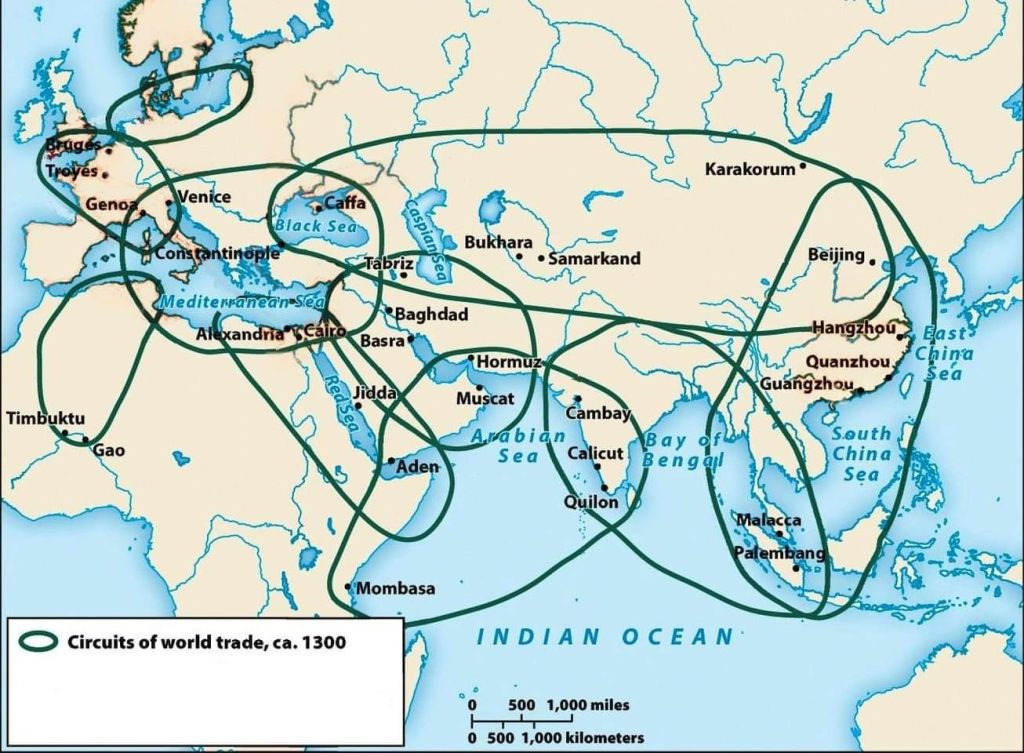
The World System

To Victory!

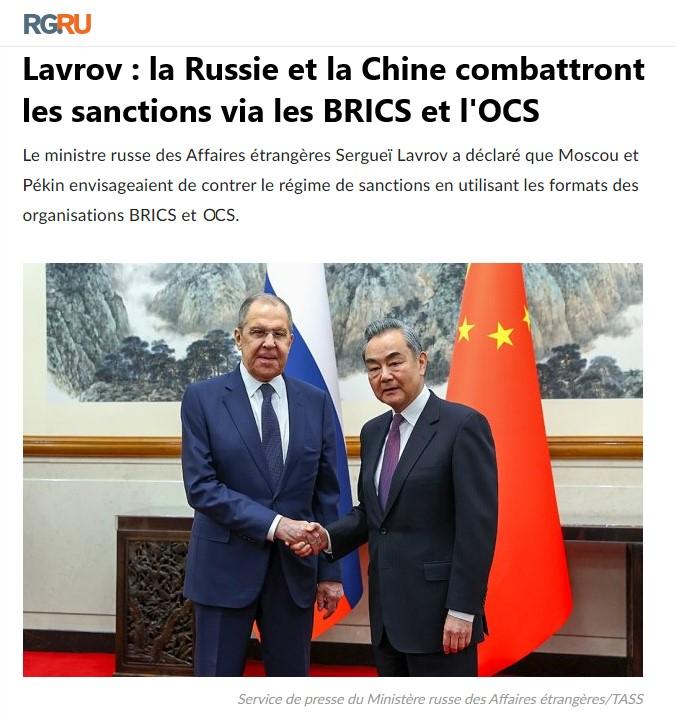
 Le ministre russe des Affaires étrangères Sergueï Lavrov a déclaré que Moscou et Pékin envisageaient de contrer le régime de
Le ministre russe des Affaires étrangères Sergueï Lavrov a déclaré que Moscou et Pékin envisageaient de contrer le régime de
L’article Lavrov en visite à Pékin est apparu en premier sur STRATPOL.
Takeaway from Moscow: Normal-o-philes and Russophiles of the world, UNITE
By Pepe Escobar at Strategic Culture Foundation.
These have been frantic multipolar days at the capital of the multipolar world. I had the honor to personally tell Russian Foreign Minister Sergey Lavrov that virtually the whole Global South seemed to be represented in an auditorium of the Lomonosov innovation cluster on a Monday afternoon – a sort of informal UN and in several aspects way more effective when it comes to respecting the UN charter. His eyes gleamed. Lavrov, more than most, understands the true power of the Global Majority.
“A child was born, now our task is to raise him.” Moscow establishes the International Russophile Movement

Moscow hosted a back-to-back multipolar conference plus the second meeting of the International Russophiles Movement (MIR, in its French acronym, which means “world” in Russian). Taken together, the discussions and networking have offered auspicious hints on the building of a truly representative international order – away from the agenda-imposed doom and gloom of single unipolar culture and Forever Wars.
The opening plenary session in the first day fell under the star power of Foreign Ministry spokeswoman Maria Zakharova – whose main message was crystal clear: “There can’t be freedom without free will”, which could easily become the new collective Global South motto. “Civilization-states” set the tone of the overall discussion – as they are meticulously designing the blueprints of economic, technological and cultural development in the post-Western hegemonic world.
Professor of International Relations Zhang Weiwei at Fudan University’s China Institute in Shanghai summarized the four crucial points when it comes to Beijing propelling its role as a “new independent pole.” That reads like a concise marker of where we are now:

Fighting the “theo-political war”
“Global Rest”, incidentally, is a misnomer: Global Majority is the name of the game. The same applies to “golden billion”; those that profit from the unipolar moment, mostly across the collective West and as comprador elites in the satraps, are at best 200 million or so.
Monday afternoon in Moscow featured three parallel sessions: on China and the multipolar world, where the star was Professor Weiwei; on the post-hegemony West, under the title “Is it possible to save the European civilization?” – attended by several dissident Europeans, academics, think tankers, activists; and the main treat – featuring the frontline actors of multipolarity.
I had the honor to moderate the awesome Global South session, which ran for over three hours – it could have been the whole day, actually – and featured several stunning presentations by a stellar cast of Africans, Latin Americans and Asians, from Palestine to Venezuela, including Nelson Mandela’s grandson, Mandla.
That was the multipolar Global South in full flight – as my imperative was to open the floor to as many people as possible. Were the organizers to release a Greatest Hits of the presentations, that could easily become a global hit.
Mandla Mandela emphasized how it’s about time to move away from the unipolar system dominated by the Hegemon, “which continues to support Israel”.
That complemented Benin’s charismatic activist Kemi Seba – who brilliantly personifies the African leadership of the future. In the plenary session, Seba introduced a key concept – which begs to be developed around the world: we are living under a “theo-political war”.
That neatly summarizes the Western simultaneous Hybrid War on Islam, Shi’ism, Christian Orthodoxy, in fact every religion, apart from the Woke Cult.
The next day, the second congress of the International Russophiles movement offered three debate sessions: the most relevant was on – what else – “Informational and Hybrid Warfare”.
I had the honor to share the stage with Maria Zakharova – and after my free jazz-style presentation, focused on over 40 years of practicing journalism across the planet and watching first-hand the utter degradation of the industry, we carried a hopefully useful dialogue on media and soft power.
My suggestion not only to the Russian Foreign Ministry but to everyone all across the Global South was straightforward: forget about oligarchy-controlled legacy/mainstream media, it is already dead. They have nothing relevant to say. The present and the future rely on social media; “alternative” – which is not alternative anymore, on the contrary; and citizen media, to all of which, of course, the highest standards of journalism should be applied.
In the evening, before everyone got down to party hard, a few of us were invited for an open, frank and enlightening working dinner with Foreign Minister Lavrov in one of the magnificent frescoed rooms of the Metropol Hotel, one the grand hotels of Europe since 1905.

A legend with a wicked sense of humor
Lavrov was relaxed, among friends; after an initial, stunning diplomatic tour de force which covered quite a few highlights of the recent decades all the way to the current gloom and doom, he opened the table to our questions, taking notes and answering each one of them in detail.
What’s so striking when you are face to face with the most legendary diplomat in the world for quite some time, in a relaxed setting, is his genuine sadness when faced with the rage, intolerance and total absence of critical thought exhibited especially by the Europeans. That was much more relevant throughout our conversation than the fact that U.S.-Russia relations are at an all-time low.
Lavrov though remains highly driven because of the Global South/Global Majority – and the Russian presidency of the BRICS this year. He hugely praised Indian FM Jaishankar, and the comprehensive relations with China. He suggested the Russophiles Movement should take a global role, playfully suggesting we should all be part of a “Normal-o-philes” movement.
Well, Lavrov The Legend is also known for his wicked sense of humor. And humor is most effective when it is deadly serious. So here’s the key takeaway of these frantic days in Moscow: Normal-o-philes of the world, unite.
≈≈≈
From last year’s inauguration of the International Russophiles Movement (MIR):
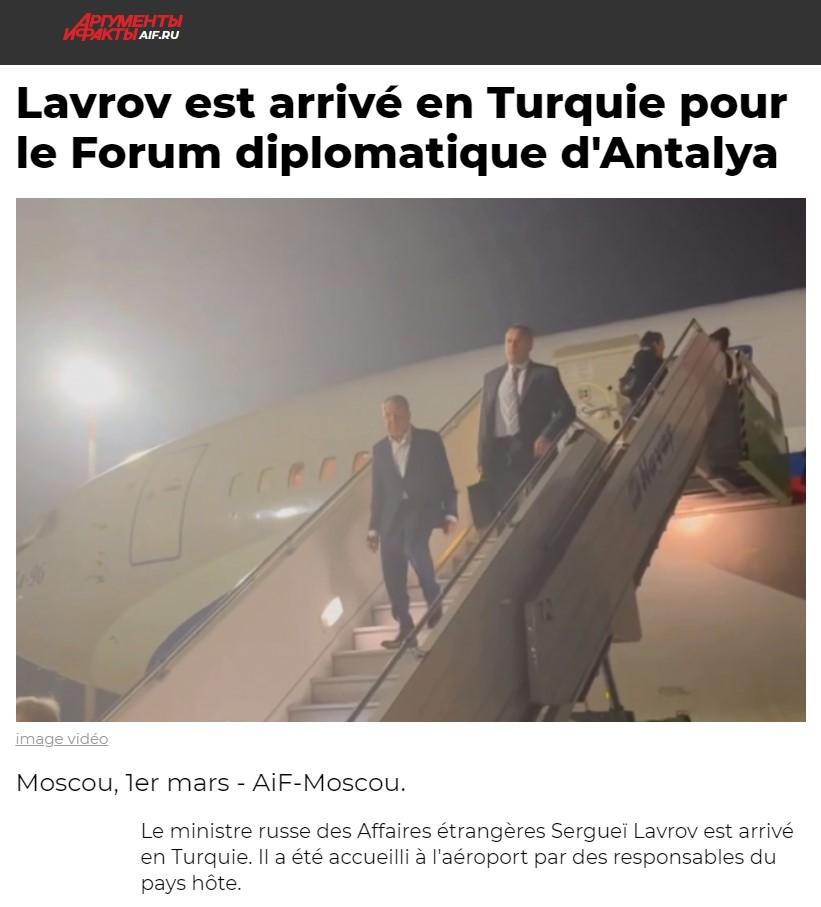
 Le ministre russe des Affaires étrangères Sergueï Lavrov est arrivé en Turquie. Il a été accueilli à l’aéroport par des
Le ministre russe des Affaires étrangères Sergueï Lavrov est arrivé en Turquie. Il a été accueilli à l’aéroport par des
L’article Lavrov est arrivé à Antalya en Turquie pour un forum diplomatique est apparu en premier sur STRATPOL.
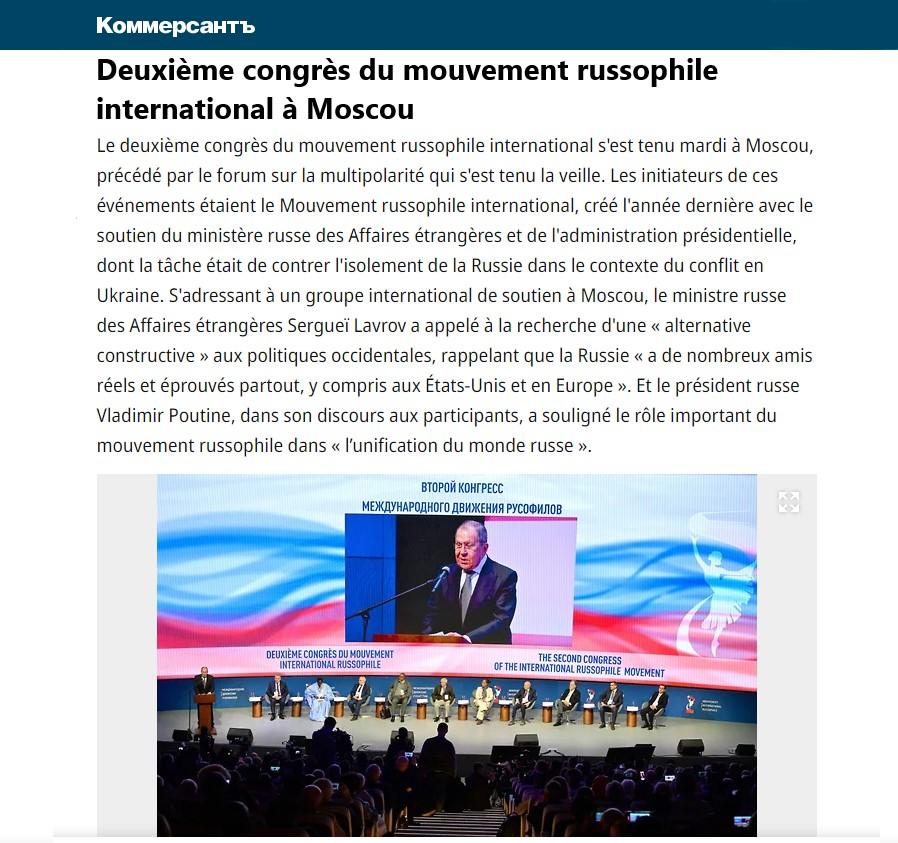
 Le deuxième congrès du mouvement russophile international s’est tenu mardi à Moscou, précédé par le forum sur la multipolarité qui
Le deuxième congrès du mouvement russophile international s’est tenu mardi à Moscou, précédé par le forum sur la multipolarité qui
L’article Le deuxième congrès du mouvement russophile international s’est tenu à Moscou est apparu en premier sur STRATPOL.
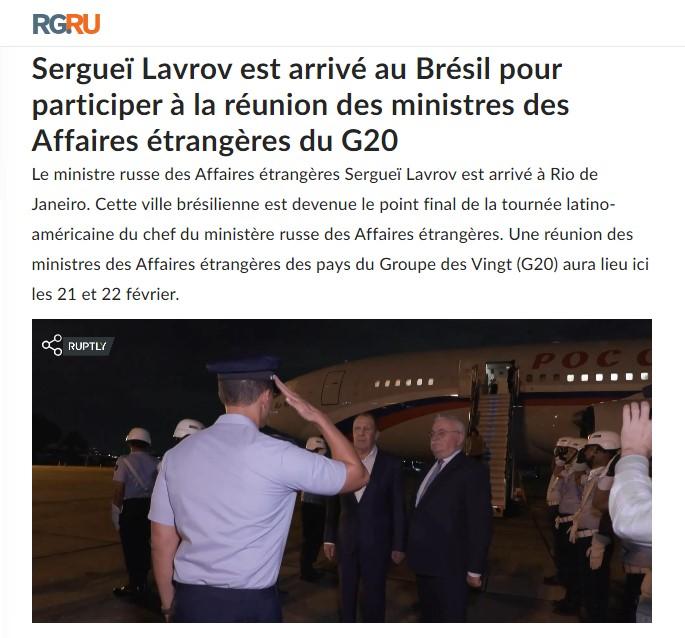
 Le ministre russe des Affaires étrangères Sergueï Lavrov est arrivé à Rio de Janeiro. Cette ville brésilienne est devenue le
Le ministre russe des Affaires étrangères Sergueï Lavrov est arrivé à Rio de Janeiro. Cette ville brésilienne est devenue le
L’article Lavrov achève sa tournée latino-américaine au Brésil pour une réunion des ministres du G20 est apparu en premier sur STRATPOL.
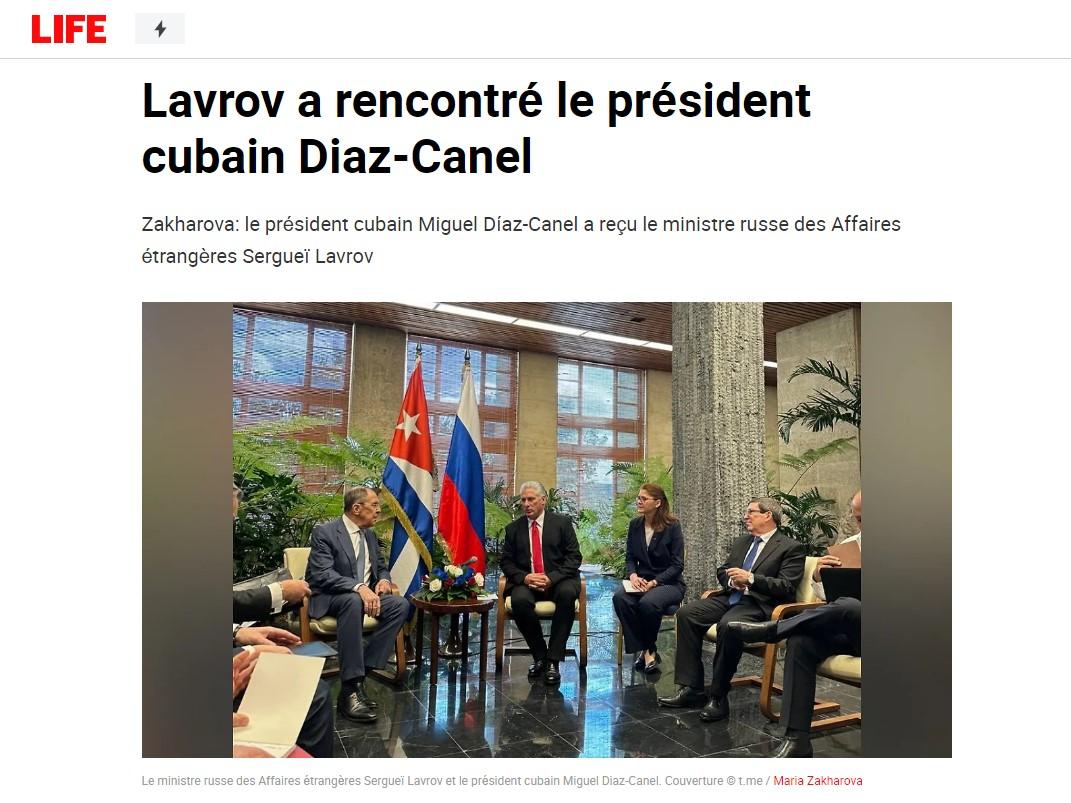
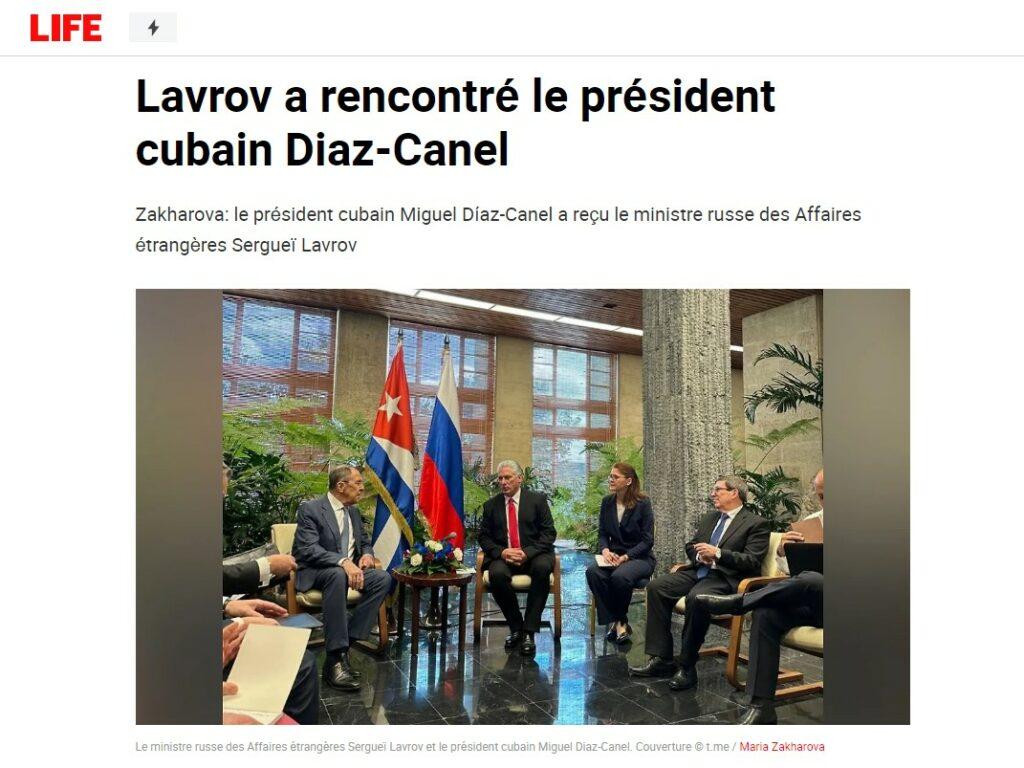 Le chef du ministère russe des Affaires étrangères, Sergueï Lavrov, est actuellement en visite de travail à Cuba. Comme le
Le chef du ministère russe des Affaires étrangères, Sergueï Lavrov, est actuellement en visite de travail à Cuba. Comme le
L’article Lavrov en visite à Cuba est apparu en premier sur STRATPOL.
Lavrov and Putin at the Forum of Supporters of Combating Contemporary Practices of Neocolonialism
Thanks to Karl at karlof1’s Geopolitical Gymnasium
The forum “For the Freedom of Nations!” was held in the Russian capital, Moscow, from February 15 to 17, 2024. Representatives from 60 countries in Africa, Asia, the Middle East, Latin America and Europe came to discuss the struggle against neocolonialism.
The United Russia political party held the initial session of what party chairman Dmitry Medvedev said would be an ongoing event happening every two years. Many readers are familiar with the works of Dr. Michael Hudson and numerous other investigators into the modern versions of Imperialism and Colonialism. What the forum is focusing on is the great acceleration in both that occurred upon the USSR’s demise that allowed for the unleashing of the “rules based order” on steroids we’ve all been direct witnesses of and in many cases fought against.
Humanity is arguably at the High Tide moment in history for the hegemonic practice known as Neocolonialism that’s associated with the “order” as the Global Majority has begun to fight back against the rising tide, forming organizations of solidarity to for it to recede, while the parasitical Neoliberal economic system within Neocolonialism has turned on its hosts and is beginning to devour them.
Today’s opening speech by Lavrov is short by his standards—under 14 minutes—but he’s not the only speaker at this event from the Russian government, with Russian media covering their utterances. Lavrov also participated in another event today, a conference marking the 10th anniversary of the coup d’état in Ukraine, to which a short media note is attached at the end of his speech. It’s a much longer discussion-beased event that will merit its own article. So, a short Lavrov speech:
Ladies and gentlemen,
Colleagues
Friends
I am glad to join the greetings that have been addressed to you. Our Forum greets you with a February frost, but I am convinced that traditional Russian hospitality and cordiality warm you up in these cold days. I am sure that this event will be useful.
For the past three decades, there has been a model of globalization “engineered” by the United States and its closest allies, which has proved untenable. The countries of the West have led humanity not to prosperity, but to one of the most acute international crises since World War II. There is an expansion of the conflict space in the world, and there is a deep split between the West and the countries of the world majority.
After the Soviet Union withdrew from the world stage, the West began to impose its “rules-based order,” in fact, its unchallenged dominance in the economy, finance, politics, and culture. The “golden billion” enthusiastically embarked on the neocolonial development of the post-Soviet space, along with the countries of the Global South and East.
Abusing the trust of the world majority, the aggressive minority, led by the United States, perfected colonial practices and did not disdain the use of force, as was the case in Yugoslavia, Iraq, Libya, Syria, and other countries in Asia and Africa.
In the economic sphere, such tools as limiting opportunities for independent development, forcing the conclusion of unfair contracts, and pumping out resources at low prices formed on Western stock exchanges were used. Former metropolises often use illegal methods of sanctions pressure on countries that refuse to submit to dictates and give up their sovereignty and national identity.
The U.S. embargo against the heroic Cuban people, sanctions against Venezuela, Iran, Nicaragua and many other countries, including North Korea, have long been the main instrument of the foreign policy of the “collective West.” The current generation of politicians in North America and Europe has apparently lost diplomatic skills, such as the ability to negotiate.
I would like to cite a few examples of the West’s attitude towards the global majority. In 2010, $100 billion was pledged to developing countries annually for 10 years for “climate finance” purposes. The West was in no hurry to fulfill its obligations – crumbs were allocated from the announced funds. In 2015, in Paris, the formula “$100 billion” was once again solemnly reaffirmed. per year for 10 years.” But nothing has changed.
On the other hand, the climate agenda has been fully used to gain market advantages over weak countries. By locating “dirty” industries abroad, Western advocates of climate justice are forcing the countries of the South to bear additional costs and buy expensive “green” technologies from the West. The money that was promised for development is being spent on the supply of weapons to the Kiev regime and other military adventures before your eyes.
The example of the distribution of vaccines during the COVID-19 pandemic is no less illustrative. From the very beginning, the Westerners “chokhom” bought up scarce drugs, leaving the poor and needy alone with their problems. At the same time, international bodies controlled by the West artificially delayed the certification of the Russian Sputnik vaccine, which could have saved millions of lives in developing countries. Western vaccines were almost instantly certified in Europe in violation of all processes. No one has been held accountable for cases of severe side effects from the use of these vaccines.
Another area of neocolonialism is the imposition of neoliberal attitudes to the detriment of traditional spiritual and moral values. Concepts such as gender diversity, drug legalization, and transhumanism are part of this destructive policy.
We are outraged by the impunity with which Westerners conduct biological experiments on living people. According to new data from the Russian Ministry of Defense, confirmed by journalistic investigations, in the city of Mariupol, once controlled by the Kiev regime, large European and American companies conducted experiments on children and adults for pennies, using drugs that almost completely suppress the immune system and stimulate the growth of cancer cells. These trials were focused on the spread of diseases and epidemics among the Slavic race. The collected materials were sent to European laboratories, their further fate is unknown. The West will never present to the world community incriminating facts about criminal biological experiments. The evasion of responsibility by neo-colonizers violates numerous international documents, including the Convention for the Protection of Human Rights and Fundamental Freedoms and the Convention on Biological and Chemical Safety. There is utter contempt for international law, not to mention human lives.
The current situation in Ukraine is a good example of how desperately the “world hegemon” is fighting to maintain its dominance. Ukraine is a tool in the hands of American puppeteers. Everyone is well aware that the future of the world order is at stake. In fact, the question is being decided in Ukraine and around it: will the world order become truly fair, democratic and polycentric? Or a narrow group of states will succeed in imposing a unipolar model on the international community, a neo-colonial division of the world into those who consider themselves “exceptional” and the rest who are assigned the role of carrying out the will of “God’s chosen.”
President of Russia Vladimir Putin presented a convincing analysis of what is happening in his numerous speeches and interviews. Our choice in all situations is to negotiate in order to find a balance between the legitimate interests of the parties. I would like to emphasise that they are legitimate. If the U.S. and its allies prefer to continue their hopeless attempts to impose their “ultimatums” in the illusory hope of holding on to the elusive instruments of neocolonial hegemony, that is their choice. Russia is ready for this as well.
Neocolonialism is a dead end. Whoever follows them is doomed to eternal conflict. Suffice it to look at the relations within the Western camp itself, where some neo-colonialists have already begun to “devour” others. Against the backdrop of economic problems, the Americans openly engaged in “sucking” resources from Europe. They are already cutting it off from promising markets for products and reliable energy supplies. For this purpose, the Nord Stream 1 and Nord Stream 2 gas pipelines were blown up without hesitation, and Germany and the whole of Europe were ordered to silently “swallow” this public humiliation. Europe obediently complied, forgetting about the old timid slogans about “strategic autonomy” and self-respect. Now European industry is forced to choose between moving business overseas and going bankrupt. However, Europeans are grown-up people, let them take care of their own fate.
The system of exploitation represented by neo-colonial practices could not be justified in any way. There is a constructive alternative – the formation of a more just and sustainable multipolar system of international relations based on the UN Charter, primarily on the principle of sovereign equality of states. It is extremely important to ensure the application of the principle of indivisibility of security at the regional and global levels, not only in the military-political dimensions, but also in the economic, social and other dimensions.
The formation of multipolarity – a world order that will reflect the cultural and civilizational diversity of the modern world and take into account the right of each nation to determine its own destiny – is a historically natural and irreversible process. A key role in it is played by new centers of power, including members of the SCO, BRICS, leaders of the African Union, ASEAN, CELAC and other integration structures of the global majority. It is important to strengthen the positions of these countries in international institutions, primarily in the UN Security Council and the G20, especially after the African Union is admitted to the G20. It is necessary to develop horizontal ties between regional associations of different continents, building a network of constructive and mutually beneficial cooperation. BRICS could play a coordinating role at the global level.
At one time, our country was a leader in promoting decolonization processes. The victory in the Great Patriotic War, which came at a huge price, made it possible to suspend the global expansion of the West for several decades. In the difficult conditions of the Cold War, the Soviet Union laid the foundation for industry in the friendly countries of the Global South and East, helped them to ensure their security and exercise their rights to sovereign development. And this is not to mention the inspiring example of the USSR, which spurred people’s liberation movements around the world.
And today, despite pressure from the West, Russia is once again fighting not only for itself, but for the whole world (as President Vladimir Putin aptly put it). In our joint efforts, we propose, first of all, to develop common approaches of the world majority to the understanding of neocolonialism, as well as to complete the work on decolonization initiated by Soviet diplomacy at the UN. After all, 17 territories still remain in colonial dependence. The metropolises are not going to release them, despite the requirements of the relevant UN resolutions.
The time has come to unite the efforts of all those gathered here and other like-minded people to begin systematic work to eradicate neocolonial practices.
I am confident that the International Inter-Party Forum of Supporters of the Struggle against Modern Practices of Neocolonialism “For the Freedom of Nations!” will be an important stage on this path. Responsible members of the international community must be mobilized to uphold justice in world affairs. To this end, the Group of Friends in Defense of the UN Charter was established. We call on the participants of the Forum to actively support its activities.
In conclusion, I would like to wish the participants in today’s discussion fruitful work, new successes for the benefit of their peoples, common prosperity and development on the basis of mutual respect, indivisibility of security and mutually beneficial cooperation.
At the forum marking the 10th anniversary of the Maidan events that led to the NATO-backed Coup in Ukraine, RT reported on the further message Lavrov had related to that issue, which will be provided in full later today:
Moscow is no longer willing to make any concessions in order to mend the rift with Western powers, leaving the ball in their court, Russian Foreign Minister Sergey Lavrov said on Friday.
The top diplomat reiterated a point made by President Vladimir Putin in his interview with Tucker Carlson, that multiple unilateral gestures by Moscow had not been reciprocated by the West.
Lavrov was answering a question on whether Donald Trump’s possible return to the White House next year could result in improved relations.
“That is their problem. We have made so many concessions, gestures of goodwill… that our reserves have been exhausted,” he said at a conference titled ‘Euromaidan: Ukraine’s Lost Decade’. “The only gesture we’ve seen from them in response to our good deeds was made with one hand.”…
Lavrov called the plan [Zelensky’s] a “baby pacifier,” the officials behind the scheme “swindlers” and “crooks,” and the entire situation a “disgrace” to Western diplomacy. He reiterated Putin’s call for the West to acknowledge that “it took a wrong, failed course” and find an off-ramp, which would allow it to save face.
Elsewhere, Nikolay Patrushev weighed-in on the illegality of the Outlaw US Empire and its UK henchman’s bombardment of Yemen in this report:
The US-led strikes against targets in Yemen are illegitimate and have no justification under the UN Charter, Russian Security Council Secretary Nikolay Patrushev said on Friday at a meeting of security officials from regional powers.
The US and UK, with support from allies, have launched dozens of attacks since January against the Houthis, a Yemeni armed militia movement supported by Iran. The stated intention was to protect maritime traffic from the militants, who have targeted trade vessels with raids and drone strikes in an attempt to put pressure on Israel.
”Washington and London have unleashed a war with Yemen under the pretext of securing freedom of navigation in the Red Sea. They are trying to drag other nations of the region into it,” Patrushev said. “However, their strikes on the positions of the Houthis are absolutely illegitimate and have nothing to do with the right of self-defense… contrary to what Washington claims.”…
Tensions are on the rise globally, Patrushev said, claiming that the core reason for the violence is “the Western intention to hold on to its dominance in world affairs at all cost.”
“People in Washington are convinced that doing so would be easiest amid a global chaos,” he added. [Emphasis original]
None of the above will be published by Western media. They will focus 100% on the death of the criminal Alexey Nalvalny, who BigLie Media propagandized as some important political figure who in reality was just a fraudster used by CIA/MI6—an event that will be used to torpedo the Putin/Carlson interview and resurrection of long buried and debunked propaganda. Given what we learned about medical advances from yesterday’s article, I’d be curious to know what the autopsy reveals as the cause of death.
≈≈
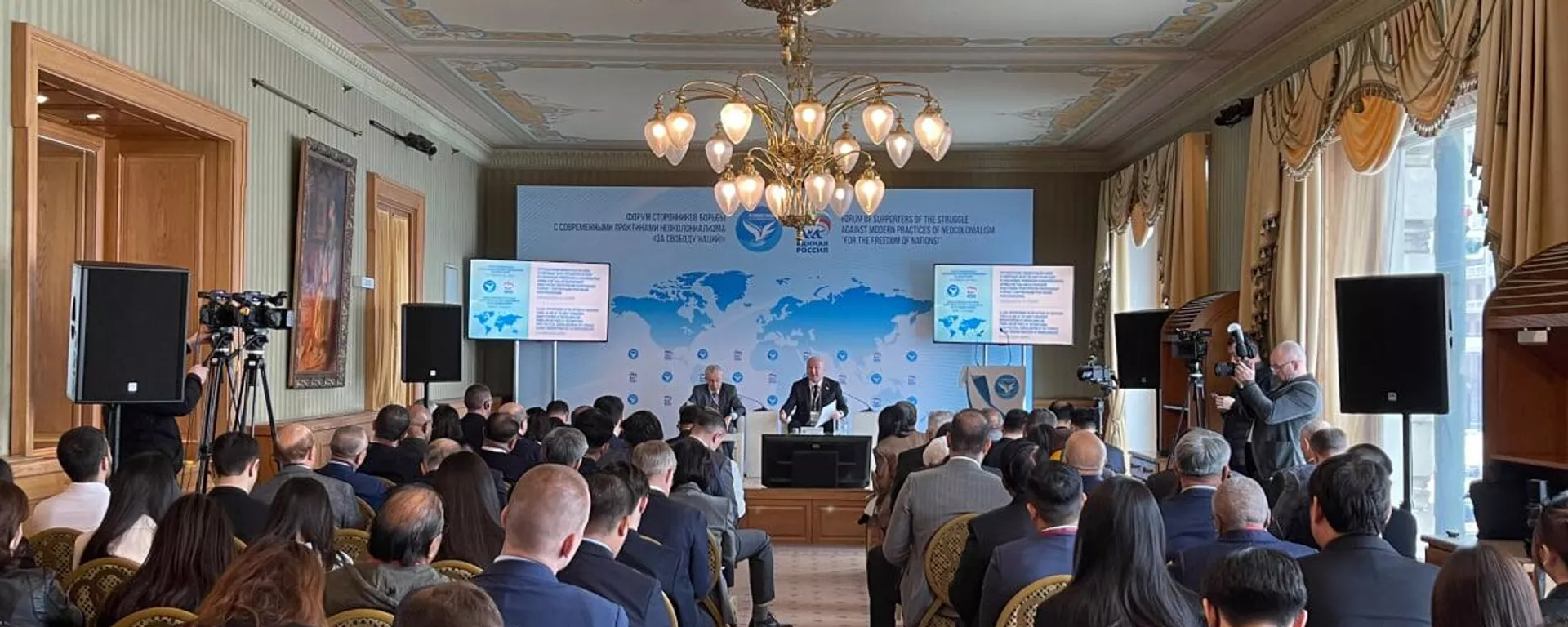
Putin: Aggressive Manifestations of Neocolonialism Are Seen in West’s Behavior Today
by Muhammad Nooh Osman at Sputnik Africa.
On Thursday, the global stage witnessed a convergence of esteemed political figures and intellectuals, including heads of state and political leaders from Africa, Russia, and other countries, in Moscow for the Forum of Supporters of the Struggle Against Modern Practices of Neo-colonialism, echoing the resounding call “For the Freedom of Nations.”
Colonial policy should have remained a shameful page of the past, but the West is still trying to resort to such practices, Russian President Vladimir Putin said on Friday, addressing the participants of the international forum “For the Freedom of Nations“, which is being held in Moscow.
The forum opened Thursday in Moscow, marking the beginning of an event that will run through February 17 and include high-level delegates from 50 countries, including South Africa, Zimbabwe, China, North Korea and others, including some NATO members.
Putin stressed that aggressive manifestations of neocolonialism can be observed today in the behavior of the collective West, in its attempts to exert economic pressure on other countries, deprive them of their sovereignty and impose foreign values.
“I consider your representative meeting an extremely important and relevant initiative. Neocolonialism is a shameful legacy of the centuries-long era of plunder and exploitation of the peoples of Africa, Asia and Latin America, and other regions of the planet. We see its aggressive manifestations today in the attempts of the collective West to maintain its dominance and supremacy by any means, to economically subjugate other countries, to deprive them of their sovereignty, to impose foreign values and cultural traditions,” the Russian leader said in his speech read at the event.
President Putin noted that such a policy has become one of the main destabilizing factors in international relations and an obstacle to the development of all mankind. According to Putin, Russia has done a lot to collapse the foundations of the colonial system and support national liberation movements.
“And today we are ready to join forces in the struggle for true freedom and justice, for the progress of all countries and peoples, for the formation of a democratic multipolar world based on the principles of international law, respect for each other’s legitimate interests, mutual trust, and creative cooperation,” he added.
He expressed hope that such meetings would become regular events and contribute to the development of responses to global challenges.
Lavrov est arrivé à New York pour une réunion du Conseil de sécurité des Nations unies portant sur l’Ukraine et la tête de Zelensky en donnant un dernier avertissement pour résoudre le problème ukrainien aux conditions de Moscou avant la grande offensive russe, car «il est encore temps». Même s’il semble en rester très peu.
L’article Lavrov est arrivé aux États-Unis pour la tête de Zelensky est apparu en premier sur Strategika.
Lavrov at UNSC: Day Two West Asia & Palestine: Using Truth as a Hammer
with thanks to Karl at karlof1’s Geopolitical Gymnasium
Lavrov pulls out a verbal hammer at the end of his remarks at the second day of special UNSC hearings on Ukraine with today’s about the situation in West Asia and Palestine in particular. Here’s Sergey with all emphasis being mine:
Mr. President,
Mr. Secretary-General,
Ladies and gentlemen,
Today we are holding a meeting on the situation in the Middle East, primarily on the Palestinian issue, at a truly dramatic moment. Not only considerations of big politics, but also universal morality require us to take urgent measures to enact a ceasefire to end the suffering of the people in Palestine. Likewise, there is a need for steps aimed at preventing further destabilization of the situation in other parts of the Middle East.
So far, our Council has not been able to provide an adequate response to this truly fateful challenge. The reason is well-known – it is the position of the United States, which blocks all efforts and initiatives to stop the bloodshed in the occupied territories. The cunning of American diplomacy, which alternately vetoes ceasefire resolutions and calls for a “reduction in the intensity” of hostilities in Gaza, is astonishing. Clearly, this gives carte blanche to continue the collective punishment of the Palestinians.
On the eve of our meeting, we made another attempt to elicit a united response from the Council to what was happening and proposed a draft presidential statement demanding an immediate humanitarian ceasefire. However, the United States and its allies blocked this document, confirming that saving the lives of Palestinian civilians is not one of their priorities.
The humanitarian consequences of such a policy are dire. Almost 30,000 civilians were killed, including a huge number of women and children. Northern Gaza is almost completely destroyed and uninhabitable. 80% of the total population of the sector are internally displaced persons. A real human tragedy with no end in sight.
The shortage of all vital necessities has reached alarming proportions. I would like to draw your attention to an article in The Jerusalem Post on January 5, written by Professor David Nitzan of Ben-Gurion University (formerly the WHO Emergency Coordinator). The article is based on the assessments of environmental experts, including Israeli specialists. Assessments cast doubt on whether Gaza will ever be habitable after the conflict ends.
As a result of the bombardment, the soil, groundwater, coastal sea area, and the atmosphere are already unprecedentedly polluted with a thick layer of products of explosions and combustion, destroyed equipment, ammunition, chemicals, decomposing biomass (no matter how terrible it may sound), household waste and sewage. Natural sources of drinking water have disappeared. In fact, the sewage infrastructure has been destroyed. It is estimated that 22% of Gaza’s agricultural land will never be restored. Tens of thousands of cases of diarrhea, acute respiratory diseases, scabies, skin rashes and other diseases have been recorded. The risk of epidemics has increased dramatically. The lack of humanitarian access is recognized by the World Health Organization as the main obstacle to the delivery of humanitarian aid. WHO has canceled six planned humanitarian missions to the northern Gaza Strip since the end of December 2023 after requests were denied.
In order to alleviate the suffering of the people of Gaza, Russia, like a number of other countries, has sent hundreds of tons of food, medical devices and medicines to the Gaza Strip. We support the UN humanitarian agencies on the ground, who, unfortunately, are also victims of the war, including 150 dead. UN Secretary-General Antonio Guterres recently spoke about this, describing this figure as unprecedented in the history of the Organisation’s participation in various operations in conflict zones.
Of particular concern is the propagation of abhorrent ideas such as the forcible displacement of Palestinians from their places of origin. Such a scenario is unacceptable and should not be implemented under any circumstances. The massive violence by the Israeli army and Jewish settlers in the West Bank must also be stopped immediately, and any attempt to undermine the status quo of Jerusalem’s holy sites must be ruled out.
The failure of this Council to take exhaustive measures has led to the fact that the current escalation of the conflict in Palestine has metastasized throughout the region. And once again, not without the disastrous participation of the United States and its allies, whose military presence in the Middle East, as well as in other parts of the Eurasian continent, creates new unacceptable risks to international security. We categorically condemn the unjustified aggression against Yemen undertaken under the leadership of Washington and London without the sanction of the UN Security Council. The actions of the Anglo-Saxons pose a direct threat to international peace and undermine a world order based not on their “rules” but on the supremacy of universal international law and the central role of the United Nations. We also condemn Israel’s bombing of Syria, including strikes that are declared to be aimed at structures that are legally present in that country at the invitation of its legitimate government. Political assassinations must stop. The situation on Lebanon’s border with Israel is explosive.
It is obvious that unilateral military actions only exacerbate the already difficult situation in the Middle East. A situation that has not developed today and reflects a long history. We are talking about the repeated invasions of independent states by the Americans and their satellites, which led to hundreds of thousands of deaths in Iraq, the destruction of statehood in Libya, the war in Syria, huge flows of refugees, and an unprecedented surge in international terrorism, including on the African continent.
Russia does not accept terrorist manifestations in any form. We also categorically condemned the attacks on civilians in Israel on October 7, 2023. Unlike some of our Western colleagues, who profess double standards, we do not divide extremists into “bad” and “good,” into “us” and “them.” We insist on the release of all detainees in Gaza, regardless of their nationality and origin.
Mr. President,
Today, we hear more and more often, primarily from Western representatives, calls to focus not on today, but on the “day after” of the Palestinian-Israeli conflict, as if the escalation in Gaza had already stopped and the situation there allegedly no longer required the Council’s attention. But the cunning logic of the Western delegations is obvious. By blocking all the Council’s much-needed efforts to call on the parties to a ceasefire, the United States and its allies want to turn this extremely uncomfortable page as soon as possible, which makes them complicit in the carnage unleashed against the civilian population in Gaza.
I would like to emphasise that the UN Security Council must still fulfil its mandate and call for a ceasefire. Otherwise, there is no guarantee that hostilities will not resume with renewed vigor. And in the absence of such a guarantee, as well as the unconditional implementation of UN decisions on the creation of a Palestinian state, all talk about “tomorrow” is not only premature, but also pointless. And this is well understood by potential donors who could invest in the future reconstruction of Gaza.
When it comes to discussing the parameters of “tomorrow”, the following factors should be of fundamental importance.
First, the consolidated will of the Palestinian people themselves. The Palestinians, who have been deprived of a chance for statehood for decades, deserve to see this issue finally resolved. The first and foremost condition for this is the unity of the Palestinian nation itself. We trust that our Palestinian brothers and sisters will show strategic wisdom and renounce all opportunistic considerations and internecine strife that impede nation-building. They should decide for themselves what their future state should look like, who should govern it and how. In my opinion, our Western colleagues call this democracy. The imposition of solutions from the outside and the “social engineering” so beloved by Western colleagues are categorically unacceptable here.
No less important is the unity of the positions of all external players, who should be guided not by their own political interests and plans in the region, trying to transmit them through one or another Palestinian faction, but by the imperative of finding a speedy solution to the centuries-old conflict. Russia has made its proposals on how to achieve this goal. They could be an important element of a new effective mediation mechanism that enjoys the confidence of both Palestinians and Israelis. We will continue this work.
The second key factor is the inviolability of the two-state formula for a Palestinian-Israeli settlement and the imperative to implement it as soon as possible. We are extremely concerned about the statements of the Israeli leadership that cast doubt on it. We would also like to draw your attention to the extremely vague statements made by the US Department of State leadership in this regard. It seems that Washington is once again relying on its supposedly “effective” but in fact absolutely failed bilateral diplomacy, hoping to somehow “settle” the parameters of the Middle East settlement that are beneficial to it before the November elections and not caring at all about the long-term consequences.
We have seen all this many times before. Each round of the arrogant unilateral policy of the United States in the Middle East, its separate, “shuttle” negotiations with the Party of Regions, accompanied by financial promises, ends in an increasingly bloody outbreak of escalation. That is what happened this time. Washington first “buried” the work of the Quartet of international mediators, and now it is consistently blocking all international efforts to de-escalate within the framework of the UN Security Council. The cynical short-sightedness of the US leadership is well illustrated by the statement by President Joe Biden’s National Security Adviser, a week before October 7, 2023, that “the Middle East region has not been so calm over the past two decades.”
Colleagues (and I am addressing my Western colleagues), the whole world is waiting for you to realise that your persistent disregard for multilateral diplomacy and its outright sabotage have repeatedly led to tragic results.
For Russia, as well as for the overwhelming majority of members of the international community, it is obvious that the logic of confrontation on the Palestinian issue can be overcome only through joint efforts based primarily on the interests of the states of the region. It is they who must ultimately decide his fate. The germs of such positive processes have already been outlined: the normalization of relations between Iran and Saudi Arabia with the assistance of China has begun, Syria’s membership in the Arab League has been restored, and a dialogue between Damascus and Ankara is being established.
The task of any international mediation is not to interfere in these processes, not to turn the region into a platform for geopolitical struggle, but to create the most favourable external conditions for restoring trust between the countries located here.
This is what all Russian initiatives for a Middle East settlement are aimed at. After the acute phase of the current crisis, which should be facilitated by the UN Security Council’s joint call for a ceasefire, we propose to convene consultations at the ministerial level to consolidate the positions of key regional players and develop practical steps on their basis to facilitate the restoration of Palestinian unity.
At the next stage, the format of an international conference on the Middle East settlement will be in demand, as the representatives who spoke before me have said. Its goal is the proclamation of a Palestinian state, the development of measures to ensure the reliable security of Israel and the normalization of its relations with all Arab and Muslim countries in general. Russia came up with the idea of convening such a conference in this hall about 15 years ago. Hopefully this idea gets the attention it deserves.
The broader idea of creating a collective security system in the Persian Gulf and in the Middle East as a whole, which would consolidate trust, transparency and guarantees of equal security for all countries in the region, remains on the table. As you know, Russia has specific proposals in this regard, which we have been discussing with all interested countries for a long time. The above is our vision for moving forward. But first, I repeat, it is necessary to achieve an immediate ceasefire.
In conclusion, I would like to call on the members of the Security Council not to succumb to the exhortations of the United States that they allegedly have “everything under control” and that they are “resolving issues on the ground,” and not to postpone the creation of a Palestinian state until better times. It is important that the UN Security Council not only reaffirm that there is no alternative to the existing international legal framework on this most pressing issue, but also outline specific ways and deadlines for its implementation. These are not just obligations arising from UN General Assembly and Security Council resolutions, the Madrid Principles and other decisions. That is the moral imperative of the international community, and we call for it to be fulfilled.
Mr. Chairman,
Today, some delegations considered it possible to repeat the accusations against Russia in connection with the special military operation against the Nazi regime in Kiev with a memorized tongue twister. Colleagues, I leave these statements on your conscience, although I understand that she will endure a lot.
I would like to emphasise a fundamental point. We have no right to allow the UN decisions on the creation of a Palestinian state to be “buried”, as the 2015 Minsk Agreements, unanimously approved by the UN Security Council, were “buried”, the guarantors of which were France and Germany, which later admitted that they did not even think of implementing them. Such criminal acts against the Palestinian people must not be allowed to happen again.
The Romans sowed the ground with salt so it was untillable as the finishing touch on their genocidal methods and the Zionists have merely modernized the method. I say we put the Zionist settlers in Gaza and let the Palestinians have the rest of Palestine. The offensive against the Outlaw US Empire was well put as was the overall argument for immediate action on mandating a ceasefire. How much of Lavrov’s and other’s views get media exposure will be important, although we can assume very little will be aired or published within NATOstan. The accusations against US, UK, and France for gross violations of UNSC Resolutions were very strong and 100% correct, but those nations have no sense of honor or morality, so I expect a continuing blockade of the required action to send the conflict into a political phase. We’ll see what happens today.
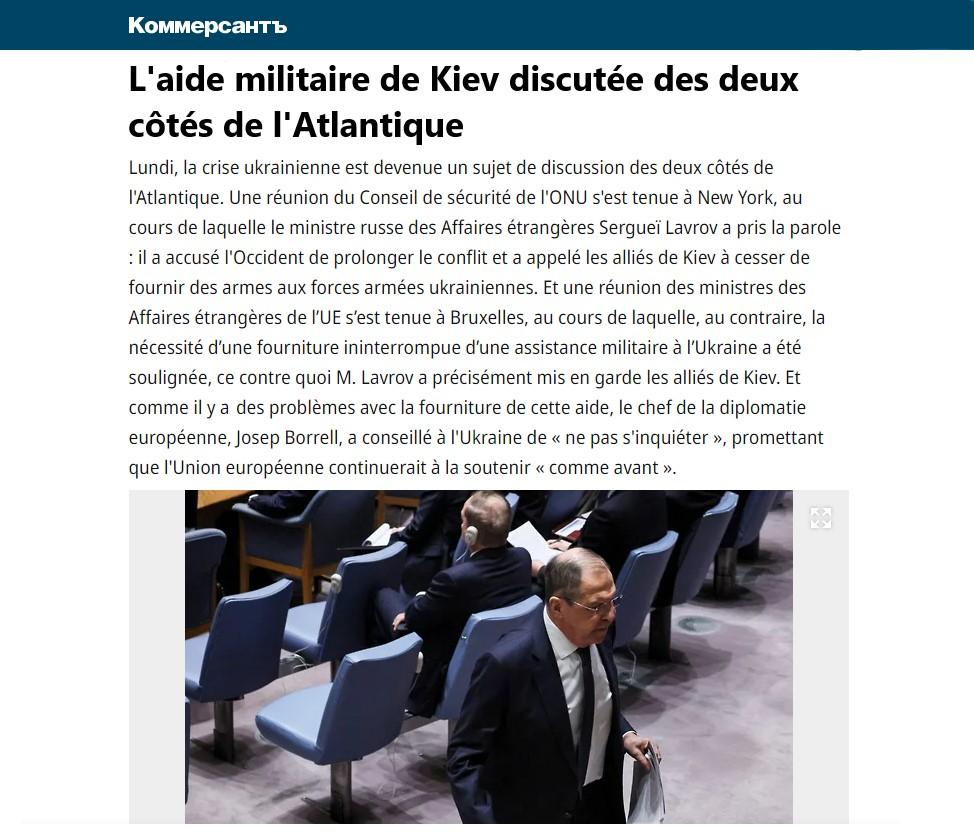
 Lundi, la crise ukrainienne est devenue un sujet de discussion des deux côtés de l’Atlantique. Une réunion du Conseil de
Lundi, la crise ukrainienne est devenue un sujet de discussion des deux côtés de l’Atlantique. Une réunion du Conseil de
L’article Lavrov au Conseil de sécurité de l’Onu pendant que l’UE décide de prolonger indéfiniment son aide militaire à Kiev est apparu en premier sur STRATPOL.

“La Russie ne peut pas gagner” déclare Emmanuel Macron le 16 janvier 2024 en conférence de presse. Le président annonce la livraison de bombes planantes à l’armée ukrainienne.
Pour profiter pleinement de l'ensemble de nos contenus, nous vous proposons de découvrir nos offres d'abonnement.
Original and Video at Ministry of Foreign Affairs website
Foreign Minister Sergey Lavrov’s statement and answers to media questions during a news conference on Russia’s foreign policy performance in 2023, Moscow, January 18, 2024
Ladies and gentlemen,
I am glad to welcome you at our annual event. Every year, we come together right after the New Year and Christmas break. I would like to offer those of you who celebrate these holidays my greetings and wish you a Happy New Year 2024. We all want to make it a better year in every respect, as President Vladimir Putin explained in quite some detail.
We have a clear vision for our domestic development plans. The Government of the Russian Federation is hard at work. President Vladimir Putin held a series of meetings with Government members over the past few days to discuss various ways to promote sustained economic progress in today’s environment, considering the aggressive and unlawful policies of the United States and its satellites. The goal is clear. It is to eliminate our dependence on any manufacturing, supply and logistics chains, financial and banking systems whenever our Western colleagues exercise too much control over them in one way or another. Previous and future decisions articulate this policy without any ambiguity.
As far as foreign policy is concerned, we have also defined our priorities for the foreseeable future. In March 2023, President Vladimir Putin approved a totally new and updated Foreign Policy Concept of the Russian Federation. It responds to the present-day reality in international affairs. The West has demonstrated its total inability to make deals and has proven to be an unreliable partner in all undertakings. The Global Majority can no longer tolerate this selfish approach and wants to prioritise its own national interests and the interests of every single country in its development efforts while strictly abiding by the principles enshrined in the UN Charter, starting with respecting the sovereign equality of states. Since the Charter was adopted in 1945, there has not been a single foreign policy initiative by the West on the international stage which took into account or respected the principle proclaiming the equal rights of nations large and small, as the Charter reads, without distinction as to race, sex, language, or religion.
On the foreign policy front, we have a clear objective to develop our relations with those who are ready to work with us on an equal, mutually beneficial and mutually respectful footing by engaging in a frank dialogue and talks for finding a balance of interests instead of taking decisions that serve someone’s selfish agenda only, which is what happens with discussions involving the US-led West in an overwhelming majority of cases.
The past year showed that there is no acceptance of the manners traditional to the Western hegemon, manners based squarely on its vested interests and disregard for the opinion of all others. Yes, 500 years of ruling the world and having no serious rivals almost for this entire period (with the exception, perhaps, of the Soviet period) seems to have made it addicted to being hegemon. But life never stops. New centres of economic growth, financial might and political influence have emerged and gained strength, significantly outpacing the United States and other Western countries in terms of development.
I am sure you know how we assess the development of Russia’s relations with the People’s Republic of China. This is the fastest growing economy along with India’s. Our relations with China are at the highest level in their entire centuries-long history. We particularly appreciate the fact that President Xi Jinping paid his first post-reelection state visit to Moscow in March 2023. In turn, President Vladimir Putin visited China in October 2023 to attend the Third Belt and Road International Forum.
The specially privileged strategic partnership with India has been making headway as well. We have established regular top-level dialogue and contacts between corresponding agencies through the foreign ministries.
Considering our immediate environs, it certainly includes the Middle East countries, Iran, Turkey, Saudi Arabia, the UAE and Qatar. Accordingly, we are interested in expanding not only bilateral relations, but also ties with regional organisations that include many of our partners. I am referring to the Gulf Cooperation Council, the League of Arab States, ASEAN, the African Union, the Community of Latin American and Caribbean States, and others.
We are working to take our partnership with Africa to a truly strategic level. This was confirmed at the second Russia-Africa Summit held in St Petersburg in July 2023.
An important milestone in the development of our relations with Latin America was the Russia – Latin America International Parliamentary Conference held in Moscow in autumn 2023. We consider Africa, Latin America and Asian countries as emerging independent centres in a multipolar world.
We were active on the UN platform in 2023. The Group of Friends in Defence of the United Nations Charter has been successfully operating there since it was established several years ago. The group has adopted joint statements on fundamental issues of global development. This group catalyses and stimulates the General Assembly’s work, promoting joint initiatives, including Russian ones. We support the ideas of our partners in this new entity.
I will note another important milestone – the adoption of a resolution on combating glorification of Nazism, neo-Nazism and other practices that contribute to fuelling contemporary forms of racism, racial discrimination, xenophobia and related intolerance. It was adopted at the 78th session of the United Nations General Assembly by an overwhelming majority of the vote, despite the chicanery of the West. However, I have to point out that for the second time in a row, Germany, Italy and Japan voted against that resolution – the Axis countries that publicly repented for the crimes committed during the Second World War after their defeat, and assured everyone that it would not happen again. These states have been voting against the resolution demanding that Nazism never be revived for the past two years, which provokes serious contemplation and makes us wonder where these ideological processes are leading, not only in these states but also in the West as a whole.
We constructively worked in other formats as well. I should specifically note our closest allies, the Union State of Russia and Belarus and the Collective Security Treaty Organisation through which we promoted stability in all dimensions, including military, biological and general security against new threats and challenges such as terrorism, drug trafficking and other forms of organised crime. The Eurasian Economic Union adopted important decisions for deepening Eurasian integration and coupling these processes with projects like China’s Belt and Road Initiative, cooperation with the Shanghai Cooperation Organisation, ASEAN and all the other associations and countries on our common enormous Eurasian continent.
This year, Russia presides in the CIS. We plan to continue the useful projects launched in 2023. As one such project, we will pay special attention to the International Russian Language Organisation founded at the CIS summit in Bishkek last autumn. All the CIS members approved this initiative proposed by Kazakhstan. The organisation is open to any country wishing to join. We know that the Russian language is popular across all continents and we hope there will be many interested participants.
I mentioned the Shanghai Cooperation Organisation as an umbrella project. Along with the Eurasian Economic Union, in the context of cooperation with ASEAN and other sub-regional bodies, this organisation objectively and organically helps us form the Greater Eurasian Partnership. President Vladimir Putin spoke about this at the very first Russia-ASEAN summit. The outlines of this partnership are already visible.
In the current conditions, it is important to have an economic partnership that meets the interests of all the countries on the continent we share. It was God’s will that we use the objective competitive advantages of sharing the same space that, as it happens, has been a driver of growth for the global economy for a very long time. And it will maintain this role for many years ahead. In addition to mutually beneficial economic projects, it is important to ensure, regardless of other factors, military and political security in Eurasia. We will support the idea that the countries on the continent should deal with this task without attempts by countries from other regions to intervene in these processes with their own rules. We are convinced that the Eurasian countries are capable of handling these tasks independently.
I have listed several regional entities, but there is also a supra-regional global association called BRICS which epitomises the diversity of the multipolar world. The decision adopted during the summit in South Africa last year to expand the number of BRICS members came as a particularly important step to strengthen the position of BRICS. Russia, which assumed the BRICS chairmanship on January 1, will pay special attention to ensuring that newcomers seamlessly join in the common work and contribute to the strengthening of positive trends not only within the association, but also in the international arena in the interests of the Global Majority. Since over 20 (even closer to 30) countries are interested in establishing close ties with BRICS, we see a bright future for this association with global representation.
We have continued to prioritise the protection of the legitimate interests and rights of Russian citizens abroad. You are well aware of how they are discriminated against in the countries of the collective West. Unlike your Western colleagues who are increasingly trying to hide the truth about journalists’ working conditions in the countries with “established democracies” (pardon the expression), many of you write about this. But in addition to the everyday problems faced by our citizens in the United States, Europe, and other countries, natural and man-made emergencies didn’t go anywhere.
Recently, we have been providing broad-based assistance to evacuate Russians and citizens of CIS countries and some other countries from Gaza and, several months before that, from Sudan riven by internal conflict.
In terms of public diplomacy, I would like to single out the milestone of creating in March 2023 of the International Russophile Movement, which is an informal association of people living on different continents with spiritual and cultural affinity for Russia. The founding meeting of this movement was successfully held and its first full-fledged congress will be held in the first half of this year.
We will continue to promote the ideals of truth and justice in international affairs. We will do our utmost to make international relations more democratic. In this sense, our Ministry strongly supports United Russia’s initiative to hold in Moscow an international inter-party forum of supporters of combating the modern practices of neo-colonialism. It is a popular theme given that the neocolonialist nature of Western policy is present in a big way in the current policies pursued by the United States and its allies. Its thrust remains the same – to use the resources of other countries to their benefit and to live off of others. The upcoming forum promises to be an engaging and important event.
Russia will host a number of major international cultural events, including the World Youth Festival, which is fast approaching, the Games of the Future which is a mix of physical sports and cybersports, and the sports games of the BRICS countries. Both games will be held in Kazan (the Games of the Future in February, and the BRICS Games in the summer of 2024.)
The Intervision international song contest is being prepared. Many countries of the Global Majority showed interest in it. We will do our best to make sure that our guests who will come to these and numerous other events fully experience Russian hospitality as in 2018, when we hosted the finals of the FIFA World Cup.
In closing, I would like to reiterate our openness to communicating with media representatives in a variety of formats. I hope the Ministry representatives present here cannot be accused of ducking the media. Other senior ministerial officials, heads of departments, and our employees (especially when they travel as part of a delegation to international events) are simply under obligation to share information about our work and to make our work clear and transparent. This is what we strive to achieve.
Question: If elections take place in Ukraine this year, can a person willing to talk to Russia come to power there? Kiev signed a security agreement with London and may sign similar agreements with other G7 countries. How important is it for Russia in the context of the future settlement of the conflict? Does it mean that Ukraine won’t have a neutral status?
Sergey Lavrov: Frankly, we are not too concerned over the details in the discussion of Ukraine’s political affairs. The issue of elections surfaced. We heard that the West strongly advised Vladimir Zelensky to hold these elections, apparently in the hope that the election campaign and the voting itself will make it possible to bring him into line with Western interests, because he is getting harder and harder to control.
Zelensky announced in public that he would not hold any elections because of the ongoing war. This reminds one of another staged performance and reflects exclusively the desire of this man and his well-known underlings to hold on to power as much as possible. This is the desire I see.
The West would like to have more flexibility. Apparently, they have already understood that the much-publicised blitzkrieg with the ultimate goal of inflicting a “strategic defeat” on Russia is a mere illusion. There has been a fundamental shift, primarily in Western minds. They realised their mistake. It is hard to admit it. Now they are looking for some external signals that would allow them to still support Ukraine while pushing Kiev to become more accommodating and listen to its Western bosses. I find it hard to predict how successful they will be in that.
As for the second part of your question, this story is nothing new. Several months ago, there were “clashes” in the West over whether to admit Ukraine to NATO or the European Union. Not everyone was in favour of this and not everyone was happy. Everyone understood that this was yet another completely senseless, irresponsible and risky move for European security. The signing of bilateral agreements with individual Western countries was invented as a product requiring additional assembly. I heard about the contents of the document agreed upon by Zelensky and British Prime Minister Rishi Sunak. I did not see in its analysis any legally binding provisions unless we consider as such Ukraine’s obligation to come to the defence of Great Britain in case of an attack. This sounds like a joke. But, on the other hand, we can regard it as a continuation of Studio Kvartal-95. Probably, now it will go by a different name.
We do not object to the agreements that other countries sign with Ukraine but this does not change our goal one iota. President Vladimir Putin confirmed this the other day. We will steadfastly pursue the goals of the special military operation and we will achieve them.
The West periodically sends us some signals and then cancels them. We take a philosophical attitude to them. President Vladimir Putin said many times that Russia does not refuse to negotiate. He said this as early as in 2022, when Boris Johnson and other Anglo-Saxons prohibited Kiev from signing an already agreed-upon treaty to reach a settlement with the Russian Federation. This is a well-known episode. It took place in April 2022. Speaking in 2022 about this issue, President Putin said again that we do not reject talks. However, those who do should realise that the more they drag it out, the harder it will be to come to terms later. Now we see how this prediction is coming true. There is no hope at all that Russia will be “defeated.” This was said many times. Those who have not studied history (there are many of them in the West) and geography know little and may engage in flights of fancy. Or they may come up with another plot for the afore-mentioned Studio Kvartal-95. But it will have nothing to do with real life.
Question: I would like to wish you a happy New Year and victory on all fronts to the Russian people.
The United States is creating “international political and military coalitions” which are committing acts of aggression against Yemen and continue to support and encourage Israeli genocide against the Palestinian people, as well as military operations against Syria and Lebanon. What is Moscow’s stance on these issues?
Sergey Lavrov: We have made numerous public statements to present our views on the developments in the Middle East, not only in Gaza but also in the Palestinian territories as a whole and in Lebanon, Iraq and, of course, Yemen.
It is obvious that the United States, Britain and some of their other allies have trampled underfoot all the norms of international law, including the UN Security Council resolution, which only called for protecting commercial shipping. Nobody was given the right to bomb Yemen, just as nobody gave NATO the right to bomb Libya in 2011. A resolution adopted back then only established a no-fly zone over Libya, which meant that the Libyan Air Force aircraft must not fly over the country, and they did not. There was not even the most far-fetched pretext for using armed force there. But the country has been bombed to dust and turned into a black hole. Nobody has been able to reassemble the Libyan state to this day. A huge number of migrants flooded Europe, making it suffer. But the Americans and the British are not suffering. The terrorists whom the West used to overthrow Muammar Gaddafi moved towards central Africa.
We can see the same arbitrariness with regard to Yemen now. It is obvious to everyone. I would say that Washington’s justifications are pathetic.
The other day, US Secretary of State Antony Blinken said in Davos that virtually every country in the Middle East wanted the United States and they wanted it leading. I cannot confidently say if the regional countries want this. We should ask them. But one of these countries, Iraq, adopted a decision several years ago stating that the United States had been in the country, its military bases had been in the country for a long time, and that this should end, and the United States should go home. But the Americans refuse to leave.
Baghdad has recently made another statement on the Americans’ reluctance to go home even though they have been encouraged to leave long ago. It is especially regrettable that Secretary of State Blinken also implied that only the United States can help negotiate peace between the Palestinians and the Israelis. He said this. We are aware of such semi-secret contacts involving the United States, Israel and several Arab countries. But these contacts do not involve a direct dialogue between the Palestinians and the Israelis. Instead, they imply that the “big guys” will sit at a table somewhere to decide how the Palestinians should live and will present their decision to them. This cannot succeed. Only a direct dialogue, which must be relaunched, can bring about progress. It went on, with difficulties, but it continued with support from the quartet of international intermediaries. We have always said that the activities of the quartet – the United States, Russia, the UN and the EU – must also involve representatives from the Arab League. It is deeply regrettable that the Americans and the Europeans blocked that idea. And then the United States dissolved all such quartets and monopolised the entire mediation process.
In September 2023, US National Security Adviser Jack Sullivan said that the Middle East region was quieter today than it has been in the past few years. A month later, a conflict broke out in Gaza. This calls for collective efforts, which the United States seems to have lost the habit of. It has become addicted to dictating.
Next Tuesday, the UN Security Council will hold a special meeting on this issue. We plan to attend it, and I will personally travel to New York for this purpose. We will put forth our ideas aimed at resuming collective efforts and ending the attempts to decide everything single-handedly, and not only in the Middle East. The United States wants to promote its agenda throughout the world. We’ll see what comes of it.
Ultimately, life itself will likely teach our Western colleagues a lesson. Regional countries must clearly show that it is their region, and the security of all states in the region is of crucial importance. While external recommendations will not be disregarded, the final decisions must be taken by the regional countries themselves.
The main focus of these efforts should be the establishment of a Palestinian state in strict compliance with the UN Security Council’s decisions. This state should be viable, as the decisions state, and live side by side with Israel and other regional countries in peace and security. Otherwise, we will continue to see outbreaks of violence like the current situation in Gaza. Without a state of their own, the Palestinian people will continue to feel disadvantaged and injured. One generation of young Palestinians after another will be aware of this injustice and will pass on this feeling to their children. This injustice must be put to an end through the establishment of a Palestinian state. I hope that the Israeli leadership will ultimately reach the same conclusion. Currently, very few people consider this solution acceptable to Israel, but this only means that efforts must continue to help them see the truth, which is that Israel’s security cannot be guaranteed without the establishment of a Palestinian state.
Russia wants Israel and its people to live in security. Israel is our long-time partner. Our country was the first to recognise Israel’s independence. About 2 million Israeli citizens also hold Russian passports and have come from Russia. Of course, we are concerned about this. We are ready to play an active role in bringing about a comprehensive settlement that will guarantee Israel’s security while strictly complying with the UN resolution on the Palestinian issue.
To be continued…
≈≈≈≈
Traditionally, Sergey Lavrov holds a large-scale press conference at the beginning of the year to assess the foreign policy events of the past year.
Sputnik Africa goes live as Russian Foreign Minister Sergey Lavrov is summing up the past year at a major press conference.
The event is held in a hybrid format: some Russian and foreign journalists have joined the conference directly in the press center of the Ministry of Foreign Affairs, while others have connected via the Internet. Moreover, the representatives of the press were able to send their questions in advance.


 Russian FM Lavrov’s statements on the Ukraine crisis:
Russian FM Lavrov’s statements on the Ukraine crisis:
 Russia sees no US, NATO readiness for fair settlement of Ukrainian conflict, they continue escalation;
Russia sees no US, NATO readiness for fair settlement of Ukrainian conflict, they continue escalation;
 West pushing Ukraine to use long-range missiles on Russian territory shows no interest in peace settlement;
West pushing Ukraine to use long-range missiles on Russian territory shows no interest in peace settlement;
 Moscow is not concerned about political life in Ukraine, West wants to have more flexibility in Ukraine’s leadership;
Moscow is not concerned about political life in Ukraine, West wants to have more flexibility in Ukraine’s leadership;
 Security issues in Eurasia must be resolved without countries outside the region.
Security issues in Eurasia must be resolved without countries outside the region.

 West is talking more about clash of nuclear powers, there are fewer deterrents, Lavrov states. The Russian foreign minister has also noted that the US wants to resume control over Russian nuclear arsenal under the guise of reciprocity.
West is talking more about clash of nuclear powers, there are fewer deterrents, Lavrov states. The Russian foreign minister has also noted that the US wants to resume control over Russian nuclear arsenal under the guise of reciprocity.
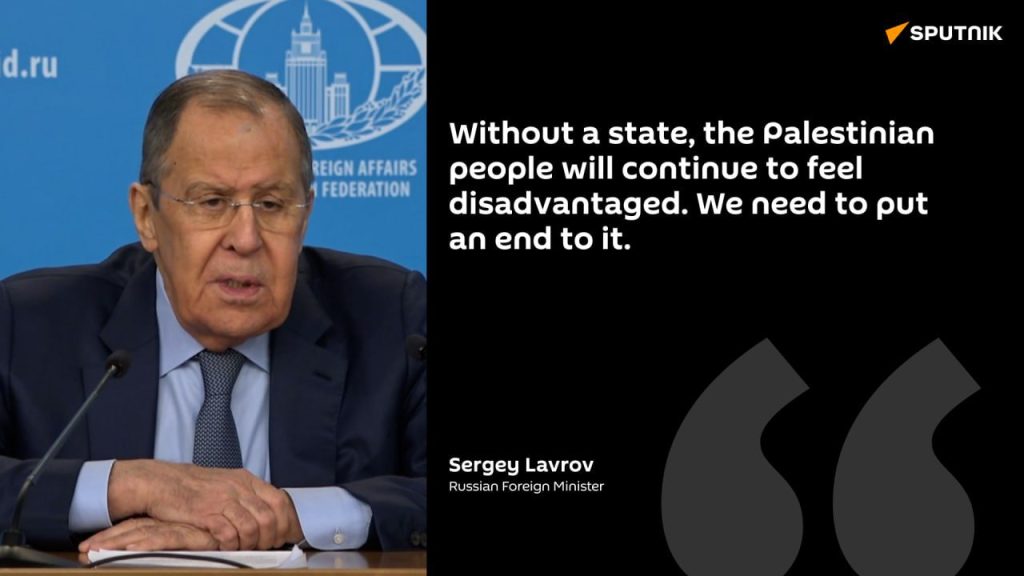

 The main focus of efforts on Palestine should be the creation of a Palestinian state, Lavrov says. He also noted that without the creation of a Palestinian state, the recurrence of violence in Gaza will continue and Israel’s security will not be ensured.
The main focus of efforts on Palestine should be the creation of a Palestinian state, Lavrov says. He also noted that without the creation of a Palestinian state, the recurrence of violence in Gaza will continue and Israel’s security will not be ensured.

 US, UK violated all norms of international law with strikes on Yemen, Russian FM Sergey Lavrov says. The UN did not give the US the right to strike Yemen, as before it did in Libya, the Russia’s top diplomat has also underscored.
US, UK violated all norms of international law with strikes on Yemen, Russian FM Sergey Lavrov says. The UN did not give the US the right to strike Yemen, as before it did in Libya, the Russia’s top diplomat has also underscored.


 Lavrov: “One of the large European countries that does not speak English” invited the Russian ambassador to think about joint projects in Africa to help regain this country’s lost influence amid the strengthening of Russia’s relations with Africa, in particular with Burkina Faso, the Central African Republic, Chad and Niger.
Lavrov: “One of the large European countries that does not speak English” invited the Russian ambassador to think about joint projects in Africa to help regain this country’s lost influence amid the strengthening of Russia’s relations with Africa, in particular with Burkina Faso, the Central African Republic, Chad and Niger.
 “The cynicism is off the charts. You remain our enemy […] but in Africa you will somehow help us… There will never be such negotiations,” added the foreign minister.
“The cynicism is off the charts. You remain our enemy […] but in Africa you will somehow help us… There will never be such negotiations,” added the foreign minister.

 Argentina’s refusal to join BRICS is the country’s sovereign decision, the Russian foreign minister says.
Argentina’s refusal to join BRICS is the country’s sovereign decision, the Russian foreign minister says.

Highlights from Russian Foreign Minister Sergey Lavrov’s statements at the press conference on the results of 2023:
Africa and BRICS:
 Moscow is taking its partnership with African countries to a truly strategic level;
Moscow is taking its partnership with African countries to a truly strategic level;
 Argentina’s refusal to join BRICS at this time is a sovereign decision of this country;
Argentina’s refusal to join BRICS at this time is a sovereign decision of this country;
 BRICS symbolizes the abundance of a multipolar world;
BRICS symbolizes the abundance of a multipolar world;
 Russia will pay special attention to ensure that new BRICS members fit seamlessly into the bloc.
Russia will pay special attention to ensure that new BRICS members fit seamlessly into the bloc.
Ukraine:
 The situation with the elections in Ukraine is increasingly reminiscent of a staging and reflects Zelensky’s desire to cling to power as much as possible;
The situation with the elections in Ukraine is increasingly reminiscent of a staging and reflects Zelensky’s desire to cling to power as much as possible;
 There are no legally binding provisions in the London-Kiev security agreement;
There are no legally binding provisions in the London-Kiev security agreement;
 Russia does not see the US interest in a settlement in Ukraine.
Russia does not see the US interest in a settlement in Ukraine.
Yemen:
 The US and UK trampled international law by striking at Yemen;
The US and UK trampled international law by striking at Yemen;
 Washington’s excuses in the situation with Yemen look pathetic.
Washington’s excuses in the situation with Yemen look pathetic.
The Palestinian-Israeli conflict:
 Semi-closed contacts involving the US, Israel and some individual states on Palestine will not be successful;
Semi-closed contacts involving the US, Israel and some individual states on Palestine will not be successful;
 Only direct dialogue is needed to resolve relations between Israel and Palestine;
Only direct dialogue is needed to resolve relations between Israel and Palestine;
 Russia is ready to play an active role in ensuring a full resolution of the conflict in the Middle East.
Russia is ready to play an active role in ensuring a full resolution of the conflict in the Middle East.
The security dialogue with the US:
 It is impossible to talk about the prospects for strategic dialogue with the US in isolation from other issues;
It is impossible to talk about the prospects for strategic dialogue with the US in isolation from other issues;
 The US has created unacceptable conditions for the implementation of disarmament treaties;
The US has created unacceptable conditions for the implementation of disarmament treaties;
 In December 2023, Russia conveyed its assessments on strategic stability to the US and warned that they had no alternative.
In December 2023, Russia conveyed its assessments on strategic stability to the US and warned that they had no alternative.
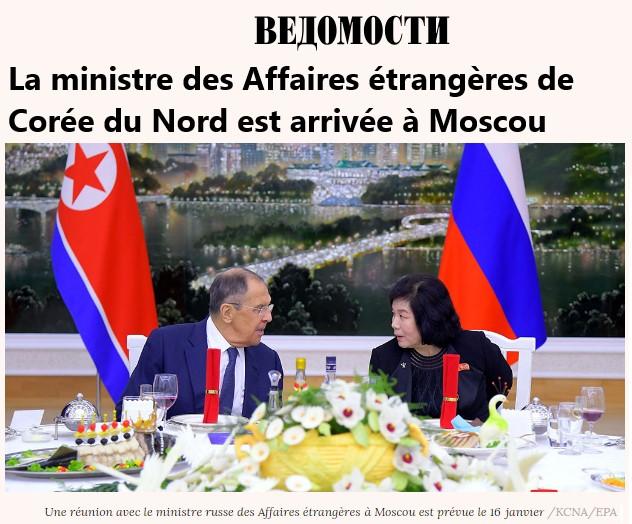
 La ministre nord-coréenne des Affaires étrangères Choi Song Hui est arrivée le 15 janvier à Moscou, où elle tiendra des
La ministre nord-coréenne des Affaires étrangères Choi Song Hui est arrivée le 15 janvier à Moscou, où elle tiendra des
L’article La ministre nord-coréenne des Affaires étrangères en visite à Moscou est apparu en premier sur STRATPOL.
On January 10, Foreign Minister Sergey Lavrov spoke over the phone (https://mid.ru/en/foreign_policy/news/1924819/)with Foreign Minister of the People’s Republic of China
 The Ministers summed up and spoke positively of the key outcomes of cooperation in 2023, expressing satisfaction with the high tempo of the political dialogue and practical cooperation, which are marked by stability and positive dynamics amid the global geopolitical instability.
The Ministers summed up and spoke positively of the key outcomes of cooperation in 2023, expressing satisfaction with the high tempo of the political dialogue and practical cooperation, which are marked by stability and positive dynamics amid the global geopolitical instability.
They focused on the implementation of agreements reached at the top political level and highlighted the importance of Russian-Chinese strategic interaction to create a just multipolar international order and, in particular, to ensure that the foundations of Eurasian security are solid.
 They noted that bilateral trade and economic cooperation has successfully overcome external challenges, with Russia-China trade passing the $200 billion mark as of the end of the year.
They noted that bilateral trade and economic cooperation has successfully overcome external challenges, with Russia-China trade passing the $200 billion mark as of the end of the year.
Sergey Lavrov and Wang Yi touched on a number of priority items on the international agenda, including the Ukraine crisis, the Palestinian-Israeli conflict, the situation surrounding the Korean Peninsula and the Asia-Pacific region in general.
They underscored their rejection of the Western bloc’s confrontational policy towards Russia and China, and the attempts to hold back their development using sanctions, deliberate provocations and other illegitimate means.
 They also noted the purely constructive nature of interaction between Moscow and Beijing within the #UN, the #SCO, #BRICS and other multilateral formats, which is not directed against third countries. The Chinese side expressed support for Russia’s BRICS chairmanship. The Ministers exchanged views on ways to facilitate China’s contacts with the #CIS.
They also noted the purely constructive nature of interaction between Moscow and Beijing within the #UN, the #SCO, #BRICS and other multilateral formats, which is not directed against third countries. The Chinese side expressed support for Russia’s BRICS chairmanship. The Ministers exchanged views on ways to facilitate China’s contacts with the #CIS.
Read in full (https://mid.ru/en/foreign_policy/news/1924819/)
Please note the BRICS explanation which I’ve bolded – Amaryth
—
https://www.mid.ru/en/foreign_policy/news/1922749/
Question: Here is a philosophical question: Yesterday, you spoke about justice, a just solution to the crisis, a just multipolar world order, etc. Now the Global South is closely watching us. What kind of justice can we offer them? How do we make it clear to them?
Sergey Lavrov: I think that any normal person, including politicians, immediately understands what injustice is when they see it. It is clear to them when issues are resolved fairly, based on a balance of interests and the key principle of the UN Charter, which emphasises the need to respect the sovereign equality of all states, big and small. Unfortunately, since the creation of the United Nations, the West, especially the United States, has failed to comply with this key principle of sovereign equality.
The Arab world is not just watching us closely; they are also closely cooperating with us. The atmosphere in Marrakesh during the meeting of the Russian-Arab Cooperation Forum, as well as my talks with the Minister of Foreign Affairs, Migration and Tunisians Abroad Nabil Ammar and the meeting with the President of the Republic of Tunisia Kais Saied, demonstrated that this is not mere observation. There is a strong desire for active cooperation, both bilateral, in terms of developing the economy and mutual investments, and in the international arena. We aim to coordinate not just on specific issues, but on fundamental matters concerning the future world order.
In this context, justice means equal rights for all states and entities established in different regions. This includes the Arab League, the Gulf Cooperation Council, the African Union, CELAC, as well as numerous subregional institutions in Africa and Latin America. In Eurasia, we have the EAEU, the SCO and ASEAN. These organisations have established close contacts, including through the Belt and Road project.
Integration processes are a natural part of life. Unlike certain plans proposed by Western countries, we do not intend to construct artificial schemes. Instead, we seek to allow these objective tendencies to interact with each other, as there are many overlapping areas where integration naturally develops. Through fair division of labour and mutual benefit for all participants, we will gradually move towards a multipolar world.
Question: Why didn’t you mention BRICS?
Sergey Lavrov: I didn’t mention BRICS because it is self-evident. I listed the organisations that are emerging at the regional level. BRICS is not an organisation but an association. I don’t think there is any interest in turning it into a formal organisation with a secretariat, at least not at this stage and for the foreseeable future. BRICS is a symbol. It represents the shared desire of a majority of countries in the world to develop their initiatives together, taking into account each other’s interests on an equal basis. It serves as a future umbrella for all subregional and regional processes. Some countries in Eurasia, Africa, Latin America and the Arab world are already part of this association. This is the future.
In the West, there are no organisations that have fair rules in terms of equality and genuine consensus. Not the kind we saw in the European Union, when Hungarian Prime Minister Orban was asked to leave the room and go have a coffee when they made some decisions concerning Ukraine. NATO enforces discipline through force. Perhaps one day, the West will realise that these trends are unstoppable and that the desire for real justice is the driving force behind the growing self-awareness of the World Majority, which includes the Global South and the Global East. We are part of this process.
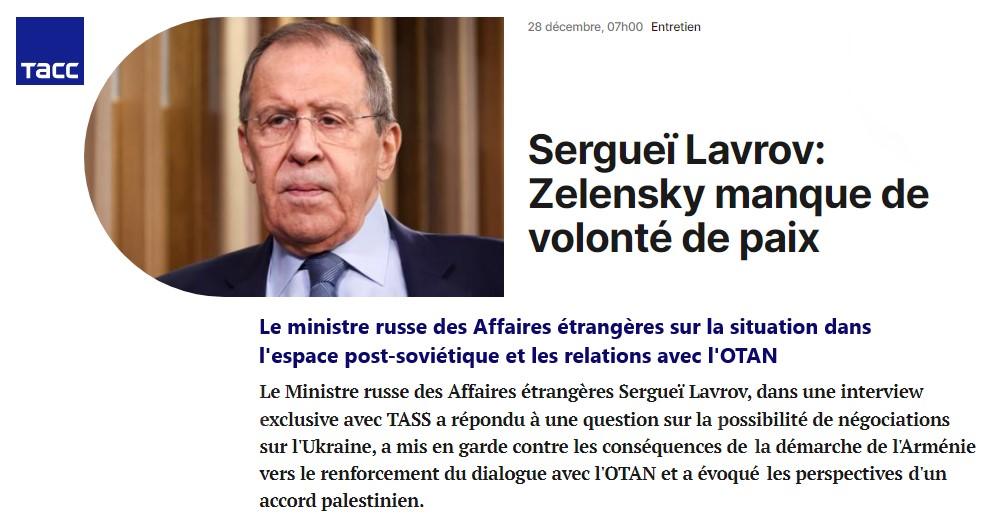
 Le ministre russe des Affaires étrangères Sergueï Lavrov, dans une interview exclusive avec TASS sur le bilan de 2023, a
Le ministre russe des Affaires étrangères Sergueï Lavrov, dans une interview exclusive avec TASS sur le bilan de 2023, a
L’article Lavrov dresse le bilan diplomatique de 2023 dans une interview est apparu en premier sur STRATPOL.
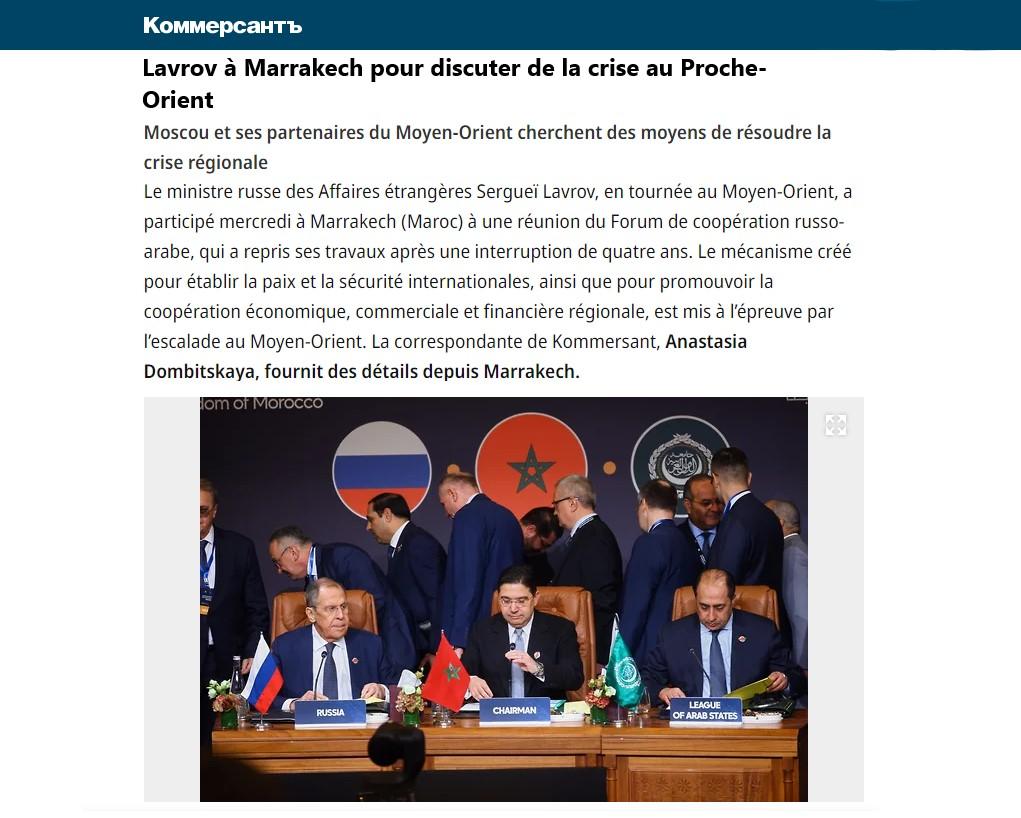
 La visite de Sergueï Lavrov au Maroc s’inscrit dans la continuité du travail de la diplomatie russe au Moyen-Orient. Après
La visite de Sergueï Lavrov au Maroc s’inscrit dans la continuité du travail de la diplomatie russe au Moyen-Orient. Après
L’article Lavrov au Forum de coopération russo-arabe de Marrakech est apparu en premier sur STRATPOL.
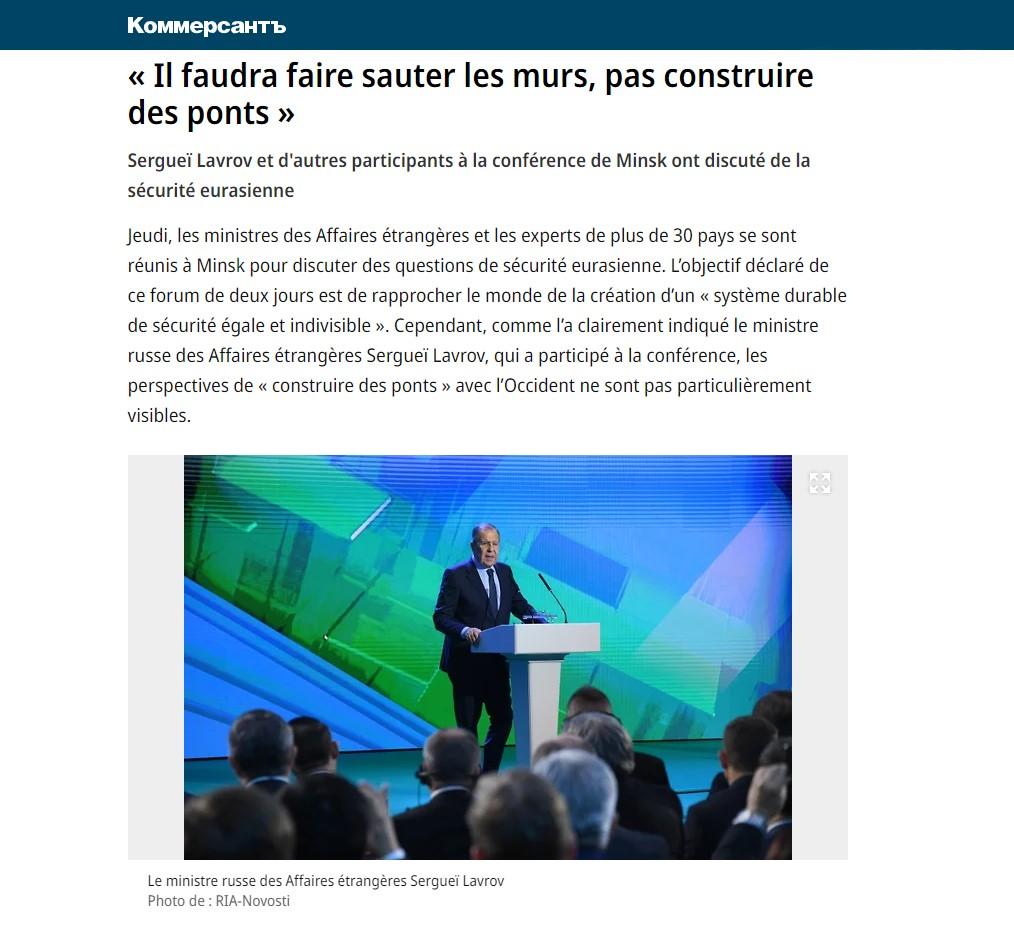
 Jeudi, les ministres des Affaires étrangères et les experts de plus de 30 pays se sont réunis à Minsk pour
Jeudi, les ministres des Affaires étrangères et les experts de plus de 30 pays se sont réunis à Minsk pour
L’article Lavrov à Minsk pour discuter de la sécurité en Eurasie est apparu en premier sur STRATPOL.
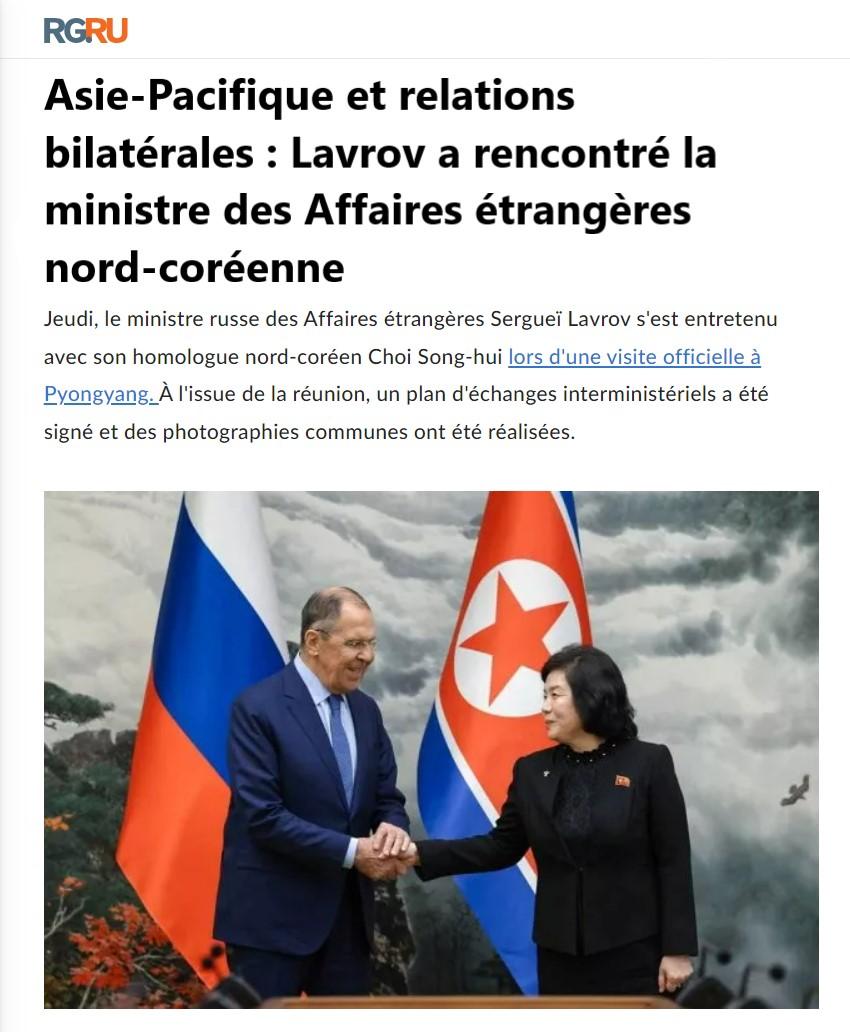
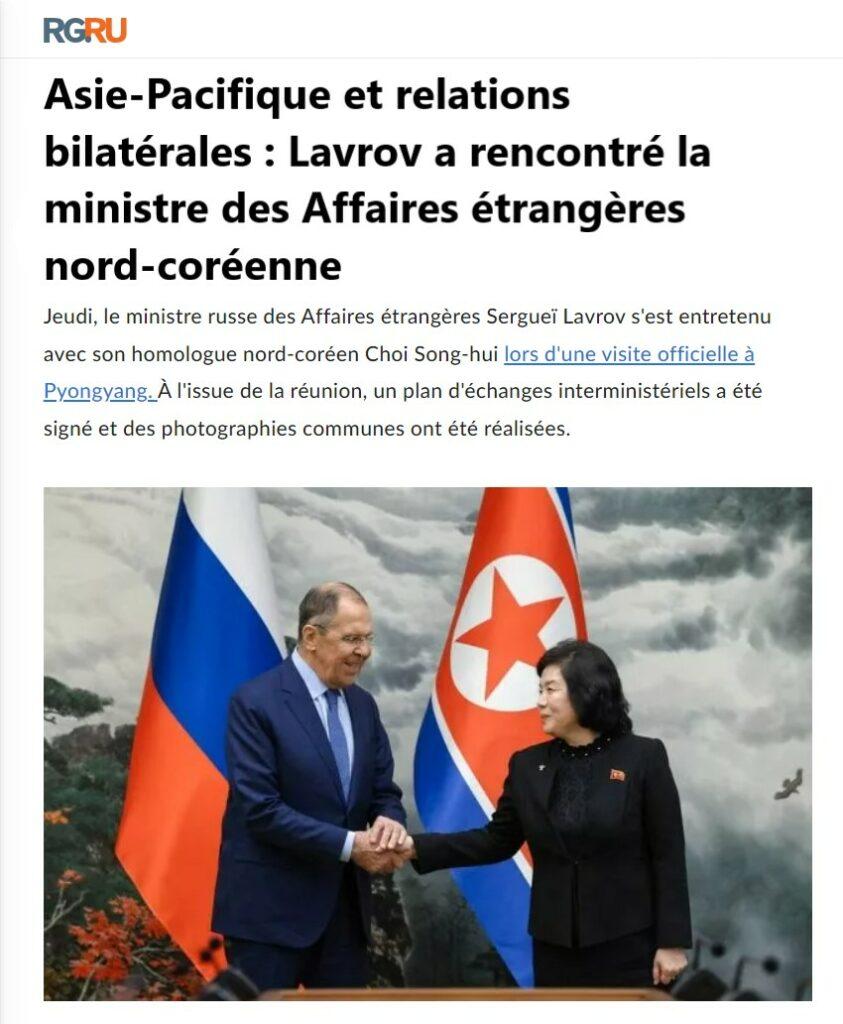 Jeudi, le ministre russe des Affaires étrangères Sergueï Lavrov s’est entretenu avec son homologue nord-coréen Choi Song-hui lors d’une visite
Jeudi, le ministre russe des Affaires étrangères Sergueï Lavrov s’est entretenu avec son homologue nord-coréen Choi Song-hui lors d’une visite
L’article Rencontre entre Lavrov et la ministre des Affaires étrangères de Corée du Nord est apparu en premier sur STRATPOL.
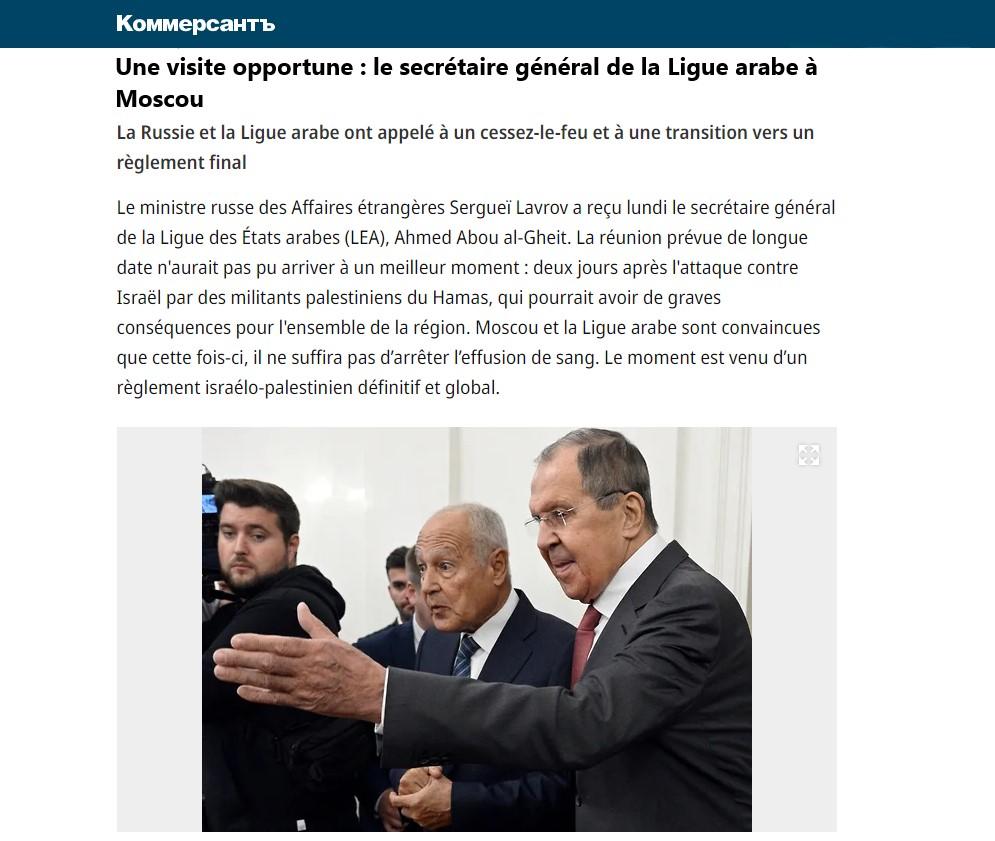
 Le ministre russe des Affaires étrangères Sergueï Lavrov a reçu lundi le secrétaire général de la Ligue des États arabes
Le ministre russe des Affaires étrangères Sergueï Lavrov a reçu lundi le secrétaire général de la Ligue des États arabes
L’article Le secrétaire général de la Ligue arabe en visite à Moscou est apparu en premier sur STRATPOL.
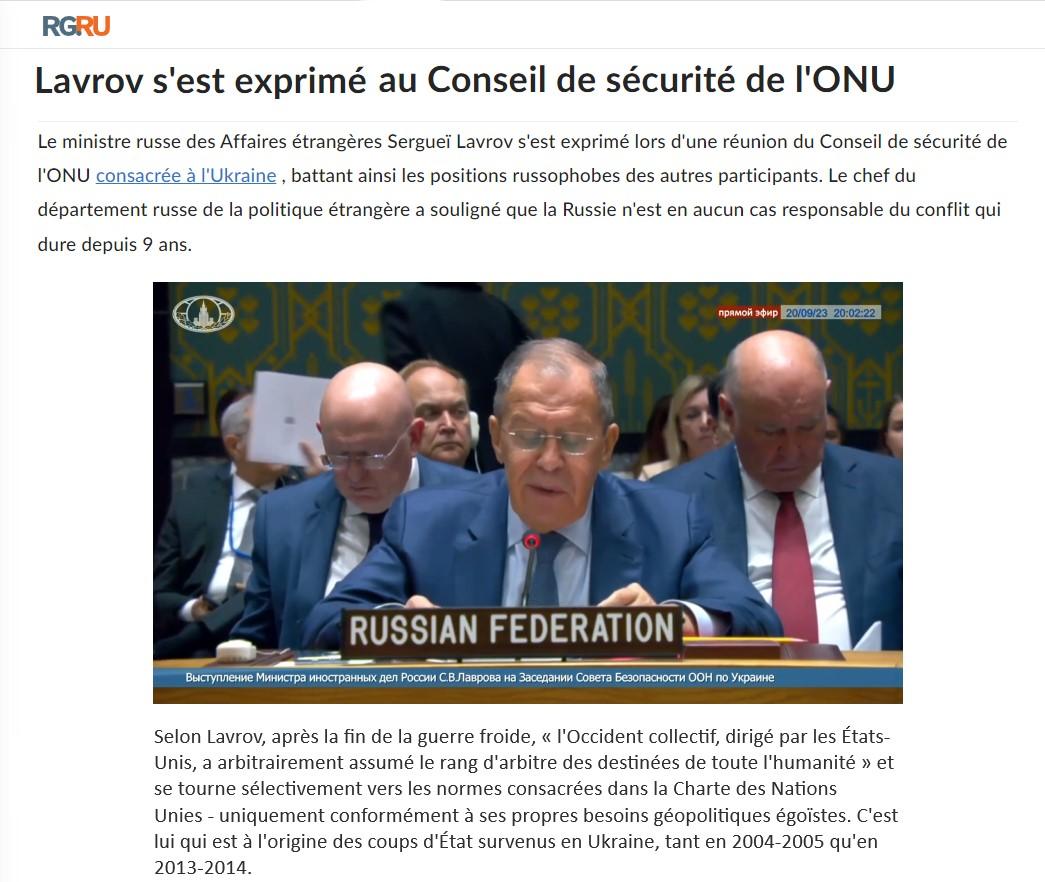
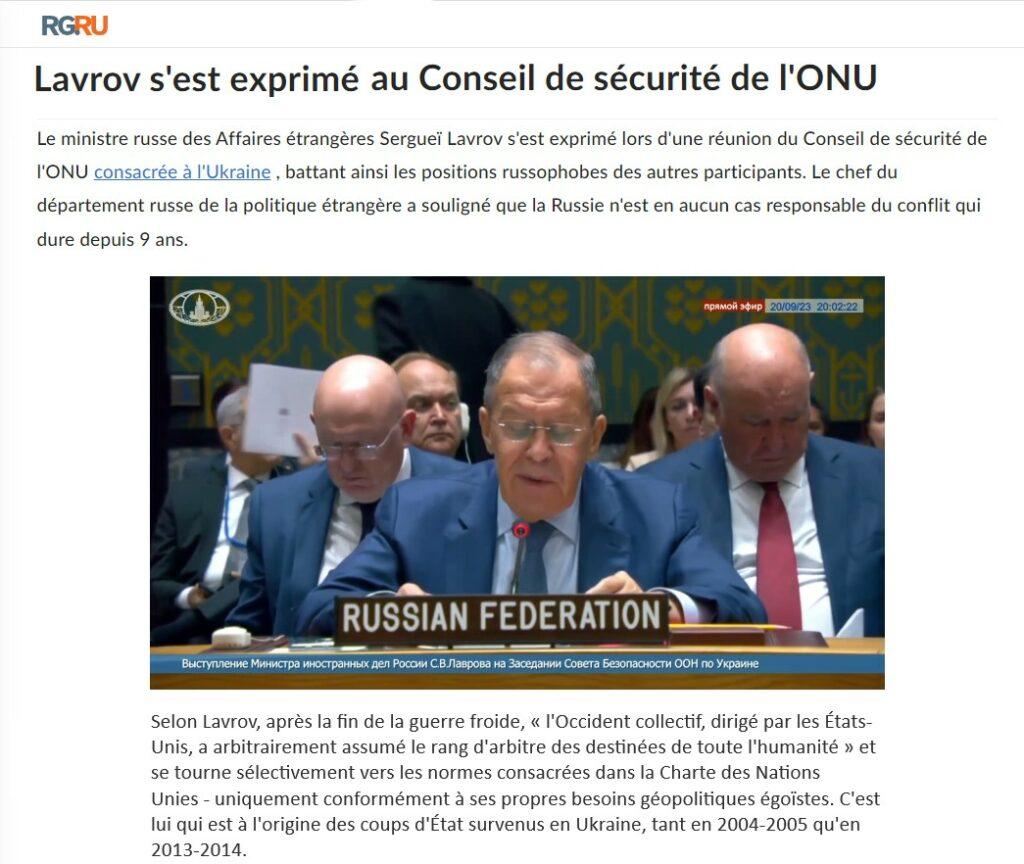 Le ministre russe des Affaires étrangères Sergueï Lavrov s’est exprimé lors d’une réunion du Conseil de sécurité de l’ONU consacrée
Le ministre russe des Affaires étrangères Sergueï Lavrov s’est exprimé lors d’une réunion du Conseil de sécurité de l’ONU consacrée
L’article Lavrov répond à l’Occident au Conseil de sécurité de l’Onu est apparu en premier sur STRATPOL.
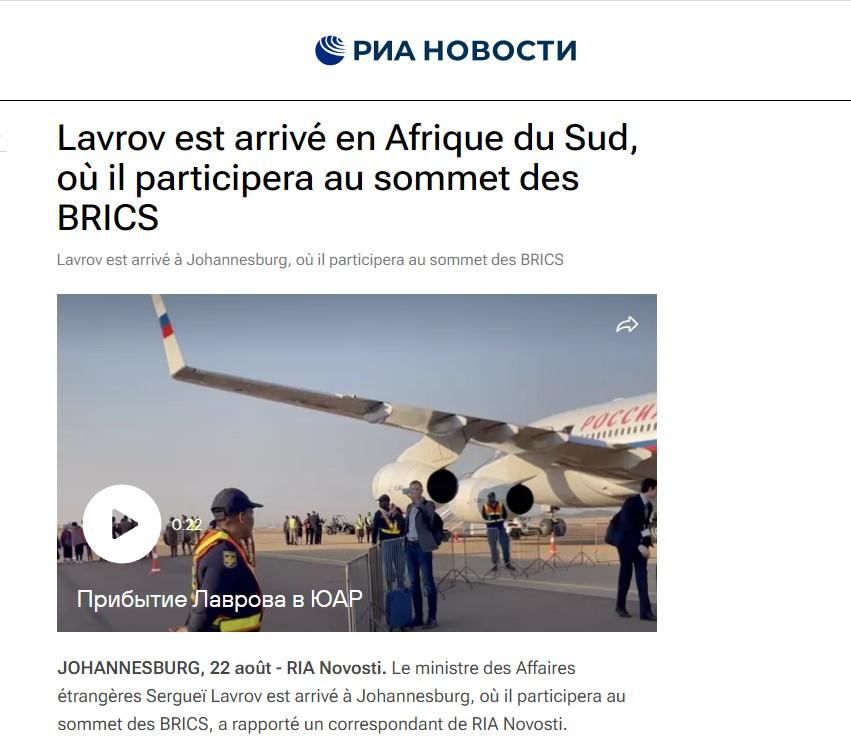
 Le ministre des Affaires étrangères Sergueï Lavrov est arrivé à Johannesburg, où il participera au sommet des BRICS, a rapporté
Le ministre des Affaires étrangères Sergueï Lavrov est arrivé à Johannesburg, où il participera au sommet des BRICS, a rapporté
L’article Lavrov est arrivé en Afrique du Sud pour le sommet des BRICS est apparu en premier sur STRATPOL.
Une rencontre «secrète» aurait été organisée, à la demande du CFR, avec Sergueï Lavrov. Y participaient Richard Haass , ancien diplomate et le président sortant du CFR.
L’article Vilnius, «un sommet de nations désespérées et paniquées» : l’OTAN face à la destruction ou à l’humiliation est apparu en premier sur Strategika.
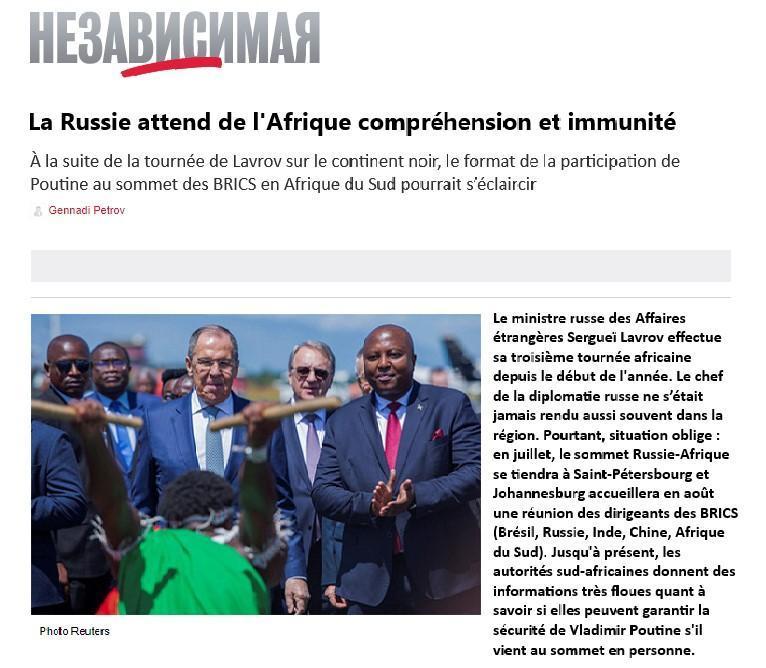
 Le ministre russe des Affaires étrangères Sergueï Lavrov effectue sa troisième tournée africaine depuis le début de l’année. Le chef
Le ministre russe des Affaires étrangères Sergueï Lavrov effectue sa troisième tournée africaine depuis le début de l’année. Le chef
L’article Lavrov en tournée diplomatique en Afrique pour la 3e fois de l’année est apparu en premier sur STRATPOL.
Discours de Sergueï Lavrov lors du sommet du G20.
L’article Lavrov réunion plenière du G20 est apparu en premier sur Strategika.